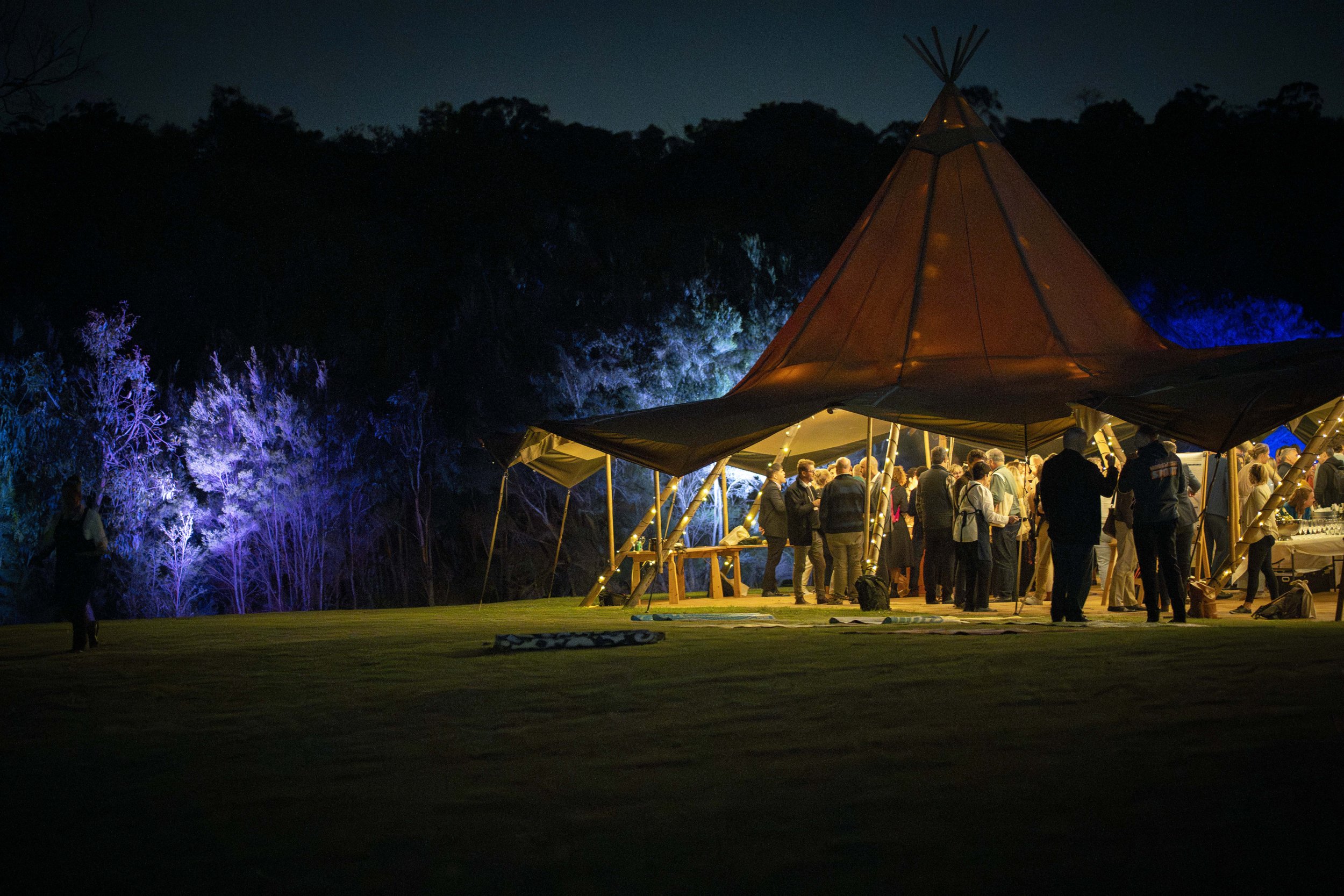
ReimaginED Melbourne 2023
Conference Report
The purpose of this report is to share the experience, highlights, and emerging ideas from ReimaginED23 in Melbourne. An executive summary is provided at the end of the report, along with a copy of the conference program, including the names of this year’s speakers.
About the conference
ReimaginED enjoys a reputation as one of the most progressive education conferences in Australia and the Asia-Pacific region. It brings together a creative community of teachers, school administrators, students, community leaders, parents, researchers, and business people with a shared goal of nurturing the transformation of learning, teaching, and educational leadership.
Unlike more traditional conferences, it is a highly participative event that creates space for dialogue and deep learning through the use of structured time for contemplation, collaboration, and co-creation. ReimaginED has become an important annual gathering for innovative thinkers and first movers looking to connect, be inspired, recharge, and find ways to collectively address the challenges that matter for the emerging futures of education.
Opening Night
Acknowledgement of Country and Cleansing Ceremony - Lionel Lauch
The conference began with an Acknowledgement of Country to show respect for the Boonurong and Bunwurrong peoples, the traditional owners of the lands on which the event was held, and their continuing connection to Country. It was led by Lionel Lauch, a Gunditjmara Kirrae Wurrung-Bundjalung man, and the Founder and CEO of Living Culture. The opening included a cleansing ceremony that involved burning various native plants to produce smoke which has cleansing properties and the ability to ward off bad spirits from the people and land. Lionel also shared some of his vast knowledge of cultural practices and stories, providing insights into the importance of deep listening, and the spiritual, physical, social and cultural connection between Aboriginal people and their land. The insights shared by Lionel helped to frame the themes of sustainability, regeneration, wellbeing, and holistic approaches to learning woven throughout the conference, and reminded participants of the important work ahead in recovering place-based knowledge systems and decolonising ways of working towards more regenerative futures.
Student provocation - Allegra Moloney
The first provocation at ReimaginED is always delivered by a young person as a way of amplifying their voice and creating a shared reference for reflection and dialogue throughout the event. On the opening night, Allegra Moloney started proceedings by sharing her love for school, as well as her ambition for an education system that better nurtures the aspirations of all young people and the development of their capabilities for independent living and learning. She reflected on the limitations of the current reality of contemporary schooling, mourning the lack of time and space it affords to engage with the development of daily living skills, such as cooking and household management, and highlighting financial literacy as a area that should have a stronger focus in secondary education. Allegra also spoke with passion of the importance of building the individual and collective capacity of young people to respond to the many complex challenges they are facing, in relation to issues such as climate change.
Regenerative Education: upscaling education at scale - Dr Kevin House
In this session, Kevin House set forth the provocation that schooling today is pathogenic, with the current dominant systems of education generating unintended consequences that are negatively impacting on the health, wellbeing, and learning of our young people. He illustrated this point through reference to the rapid global rise in stress and anxiety among students, while drawing parallels with the negative impact that many Industrial Age world views and practices are currently having on people, places, and our planet. In this session, he also explored the limitations of many current educational reforms, highlighting their reliance on quick fix, symptomatic solutions, in place of engagement with more fundamental, long lasting systemic solutions. This trend was highlighted through reference to the spread of programmatic approaches to increasing student resilience in education contexts that simultaneously perpetuate stress and anxiety through a continued emphasis on competition, high stakes testing, and narrow measures of learner success.
Significantly, Kevin also used the provocation to set out an argument for complex systems change focused on moving schooling towards a salutogenic approach that better supports health, wellbeing, and human flourishing. He grounded his thesis through the example of the curriculum framework being used by the Green School network, including reference to its practical application at the Green School in Bali. The framework features four key focus areas - learning design, evidencing learning, recognition, and the learning environment. While he described the features and value of each distinct area, Kevin concluded the session by emphasising the importance of coherence within the model for nurturing the sustainable development of learning communities characterised by health, harmony, balance, agency, and purpose.
You can access the slides from this provocation here.
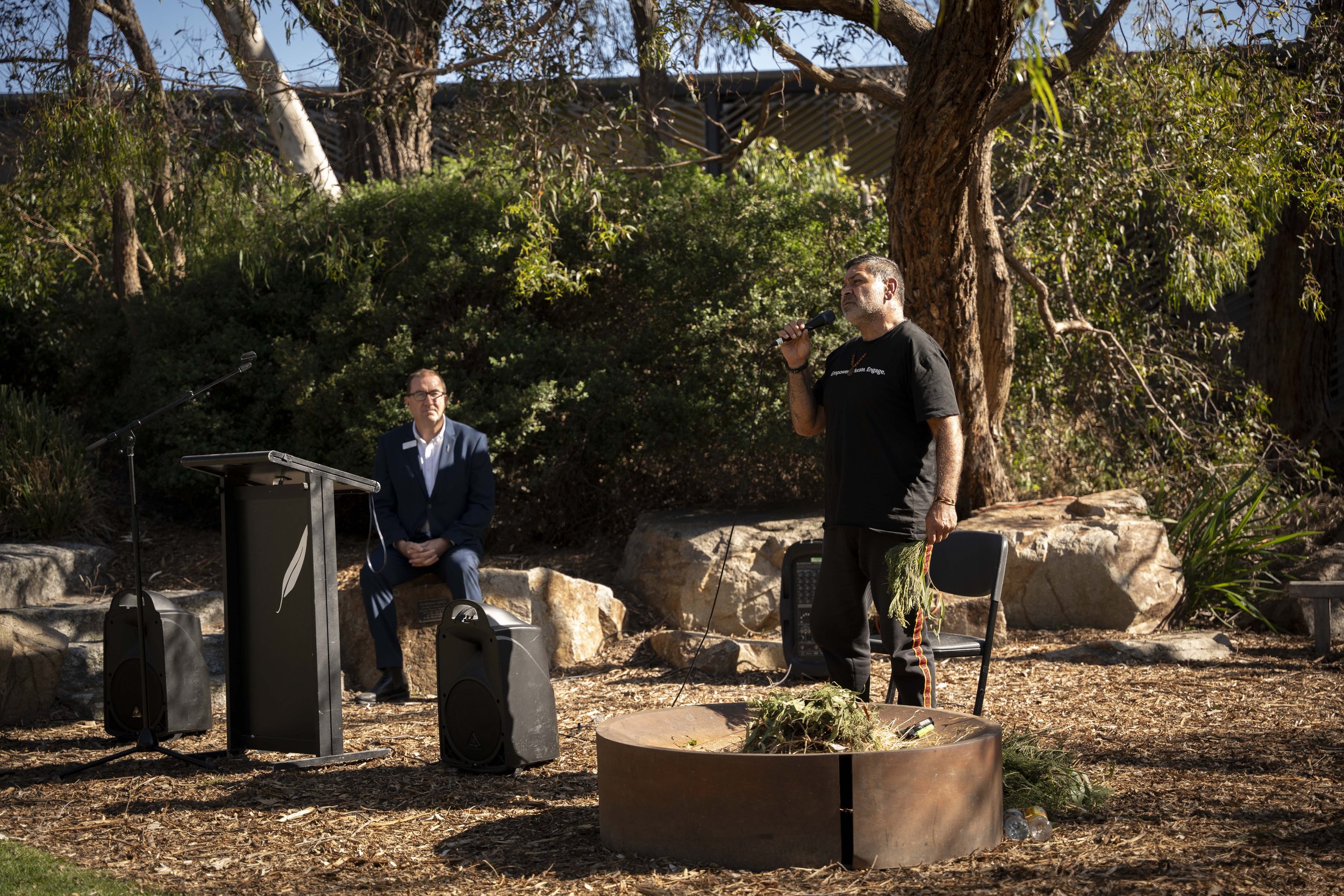
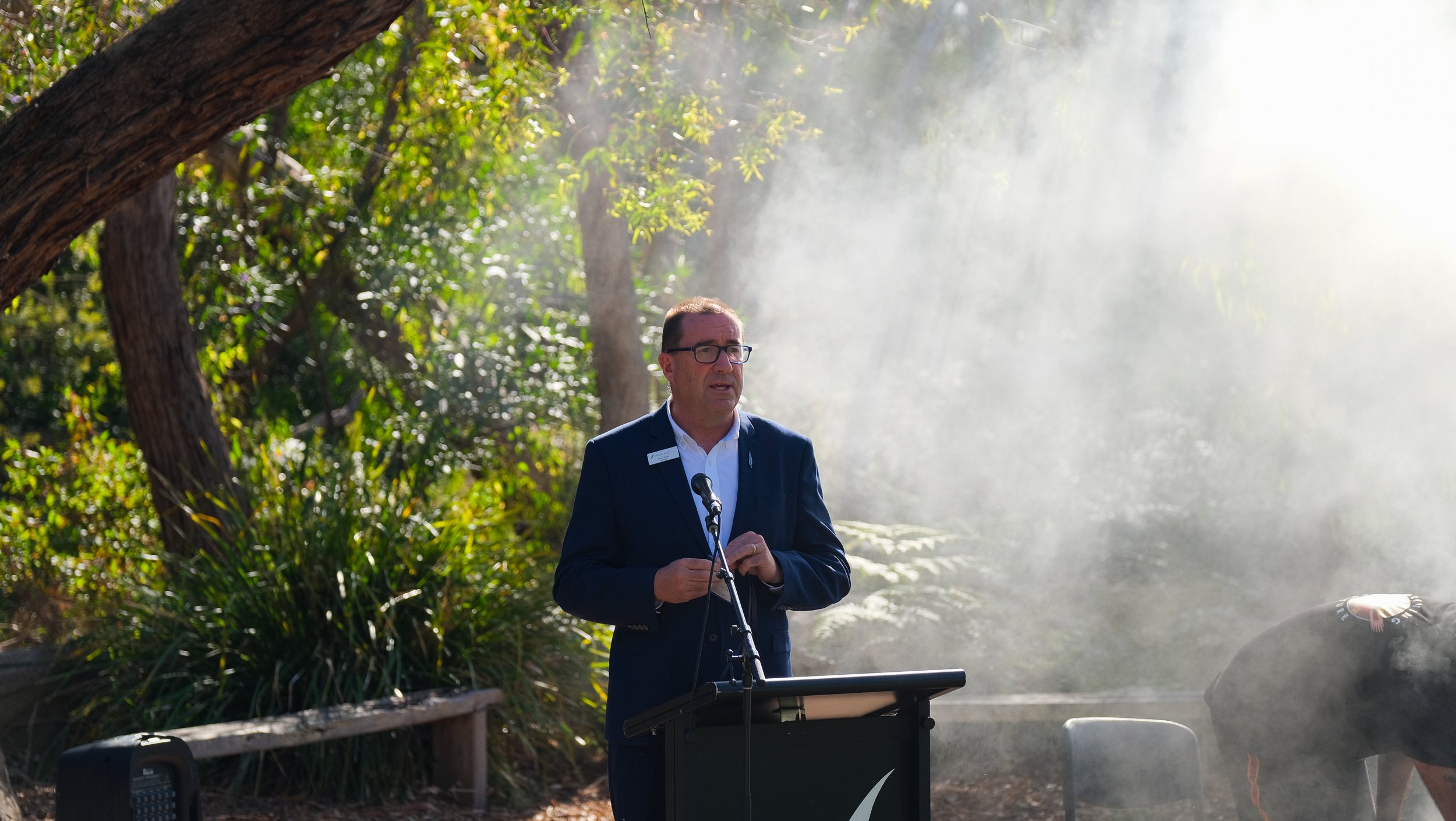
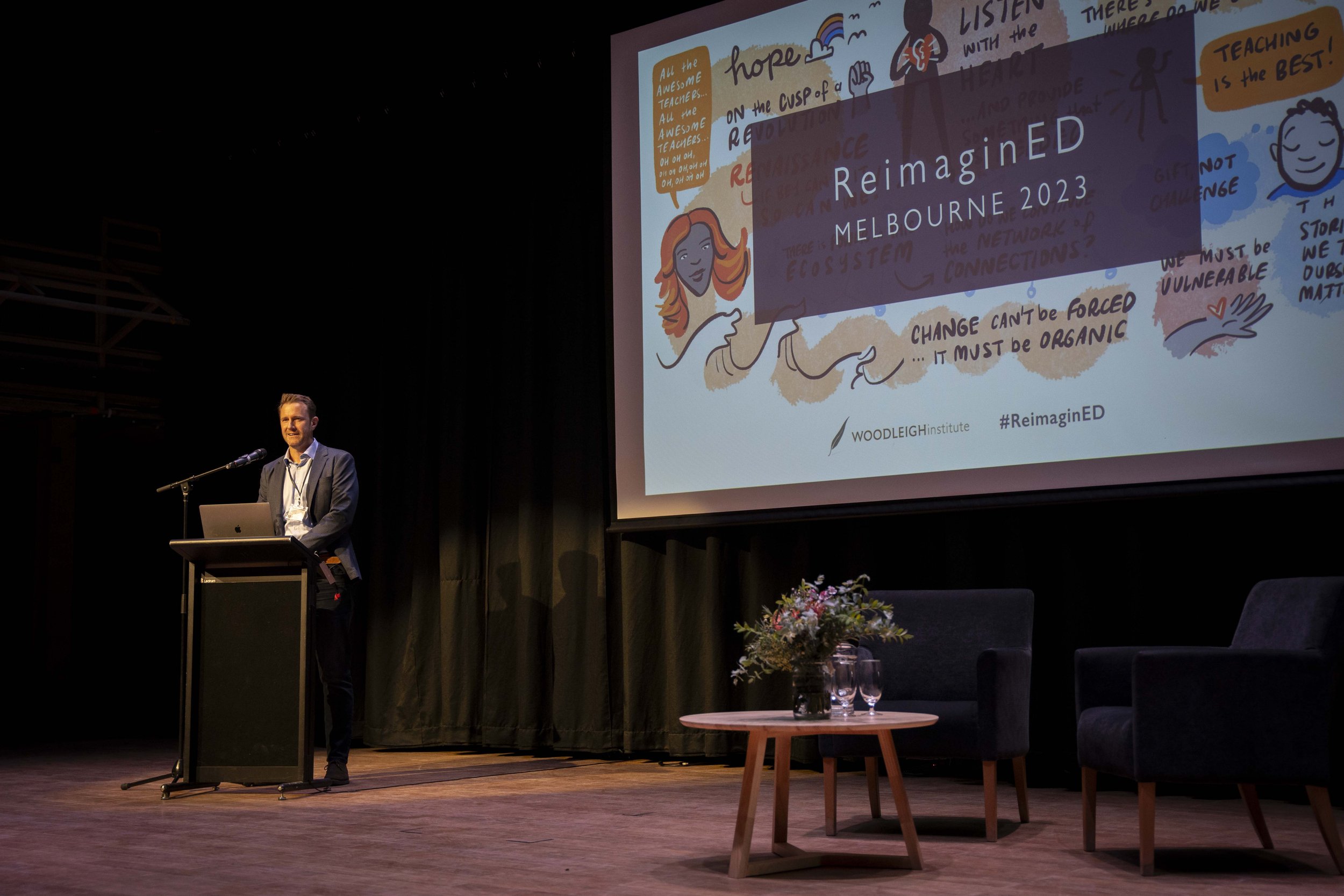
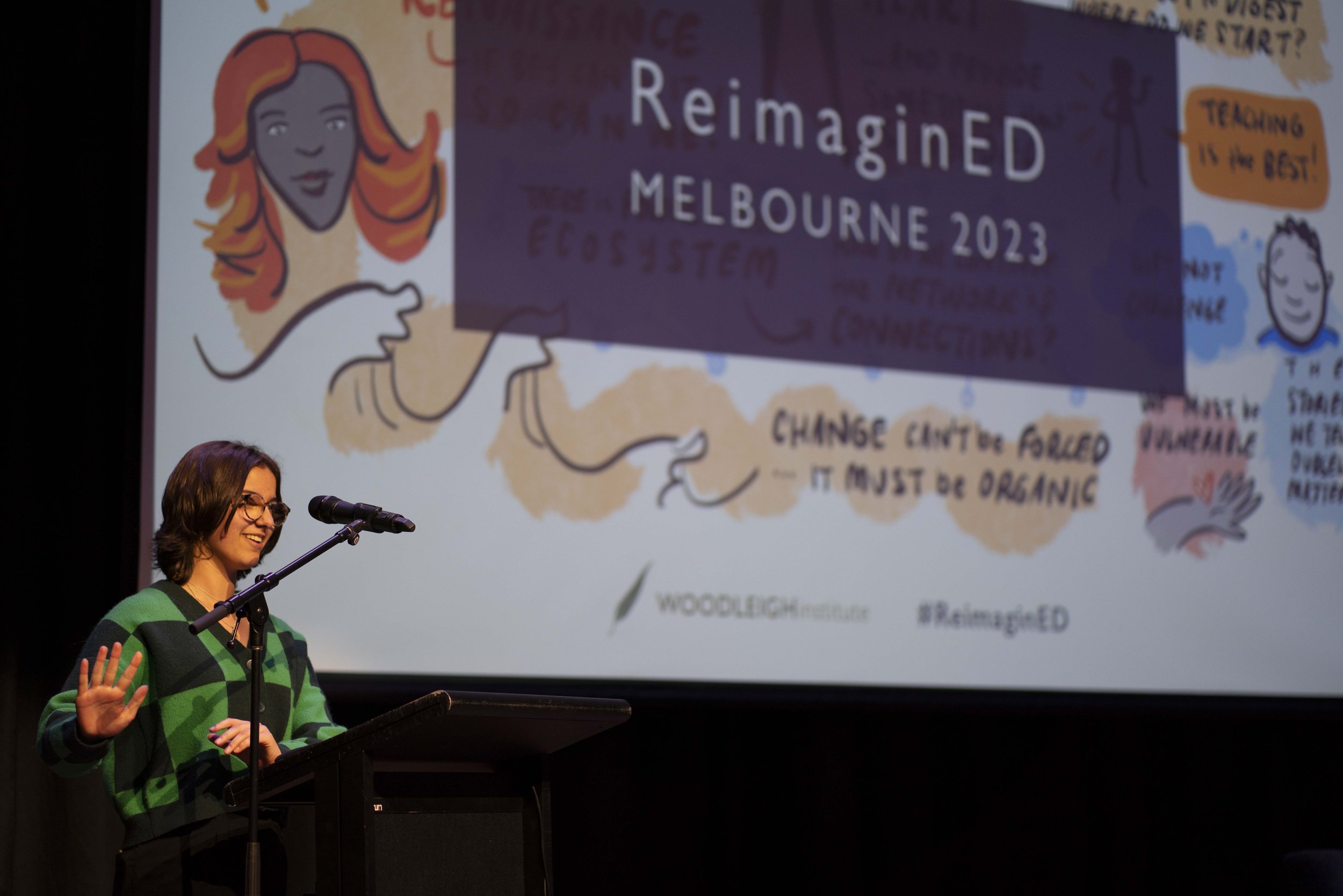
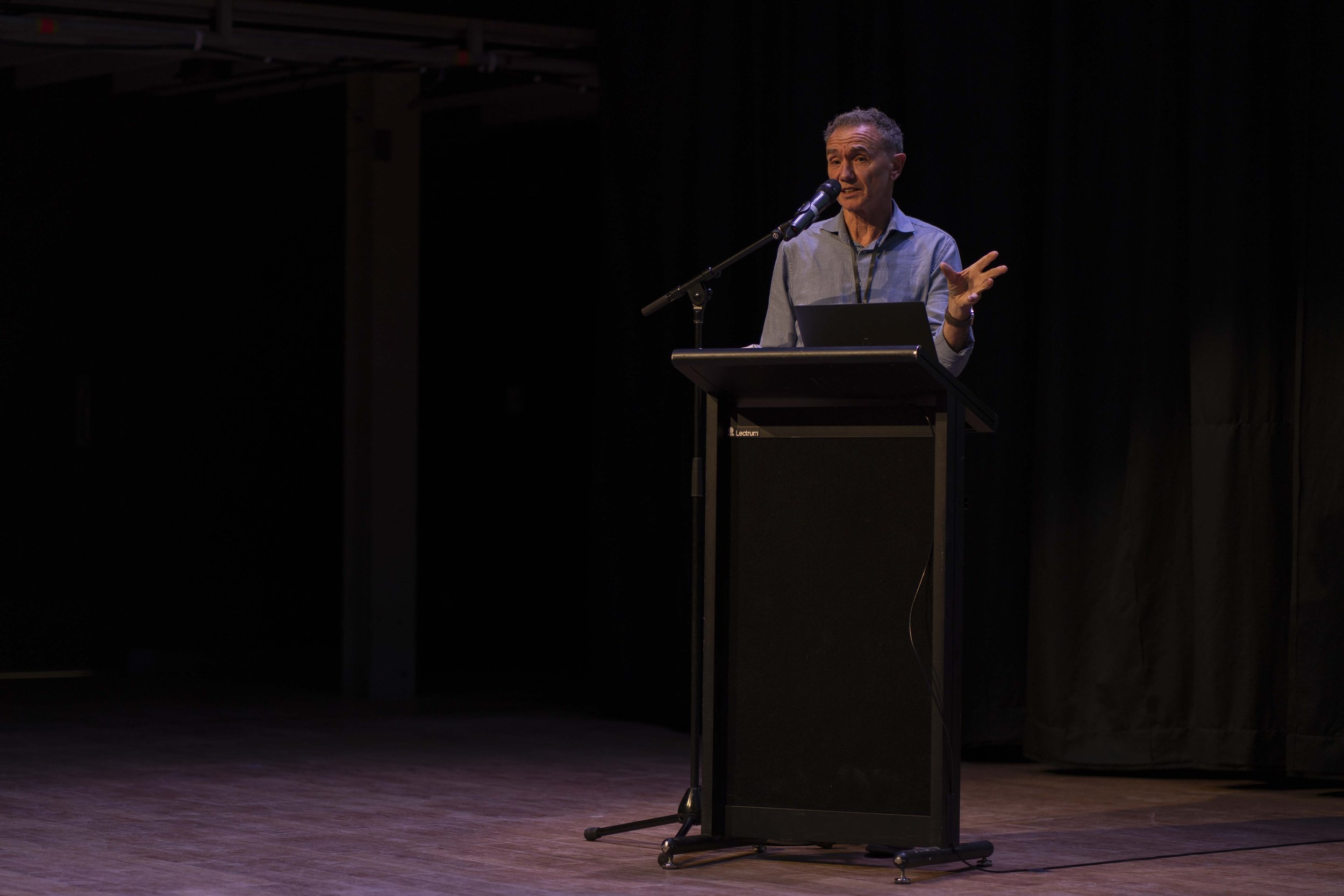
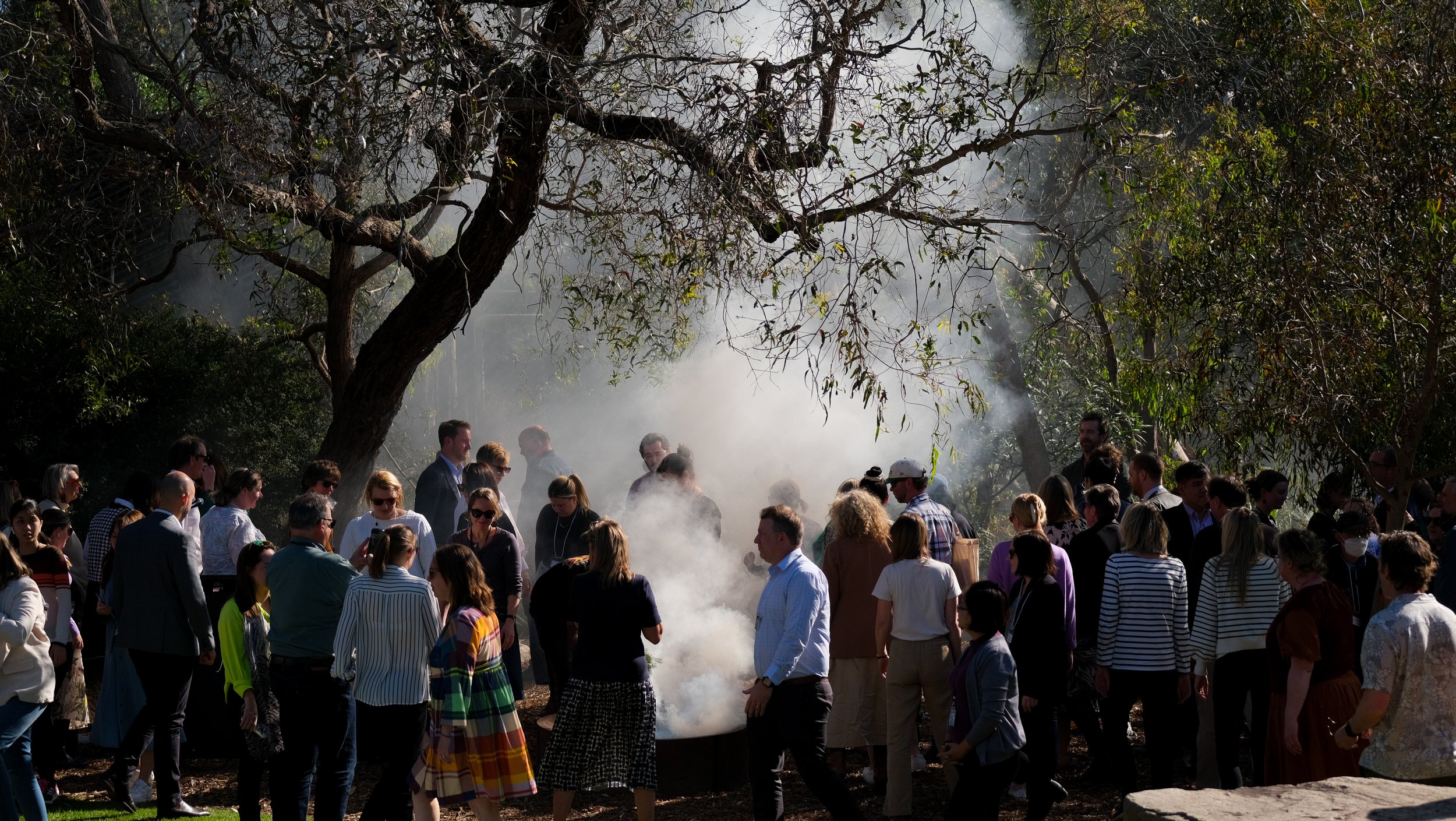
Evening breakout session
The evening breakout program featured a range of workshops, designed to create space for dialogue, collaboration, and exploration, as well as spotlight sessions, showcasing examples of innovative practice in teaching, learning, and leadership from across Australia and around the world. The topics explored in these sessions included project-based learning, agency and co-agency, learning architecture, regenerative futures, wellbeing, and systems thinking. One of the most anticipated presentations of the evening was the spotlight session from Benjamin Freud exploring a living systems approach to learning. In his session, Benjamin invited participants to draw inspiration from nature and consider the possibilities for relational learning, co-design, and emergence in our school settings.
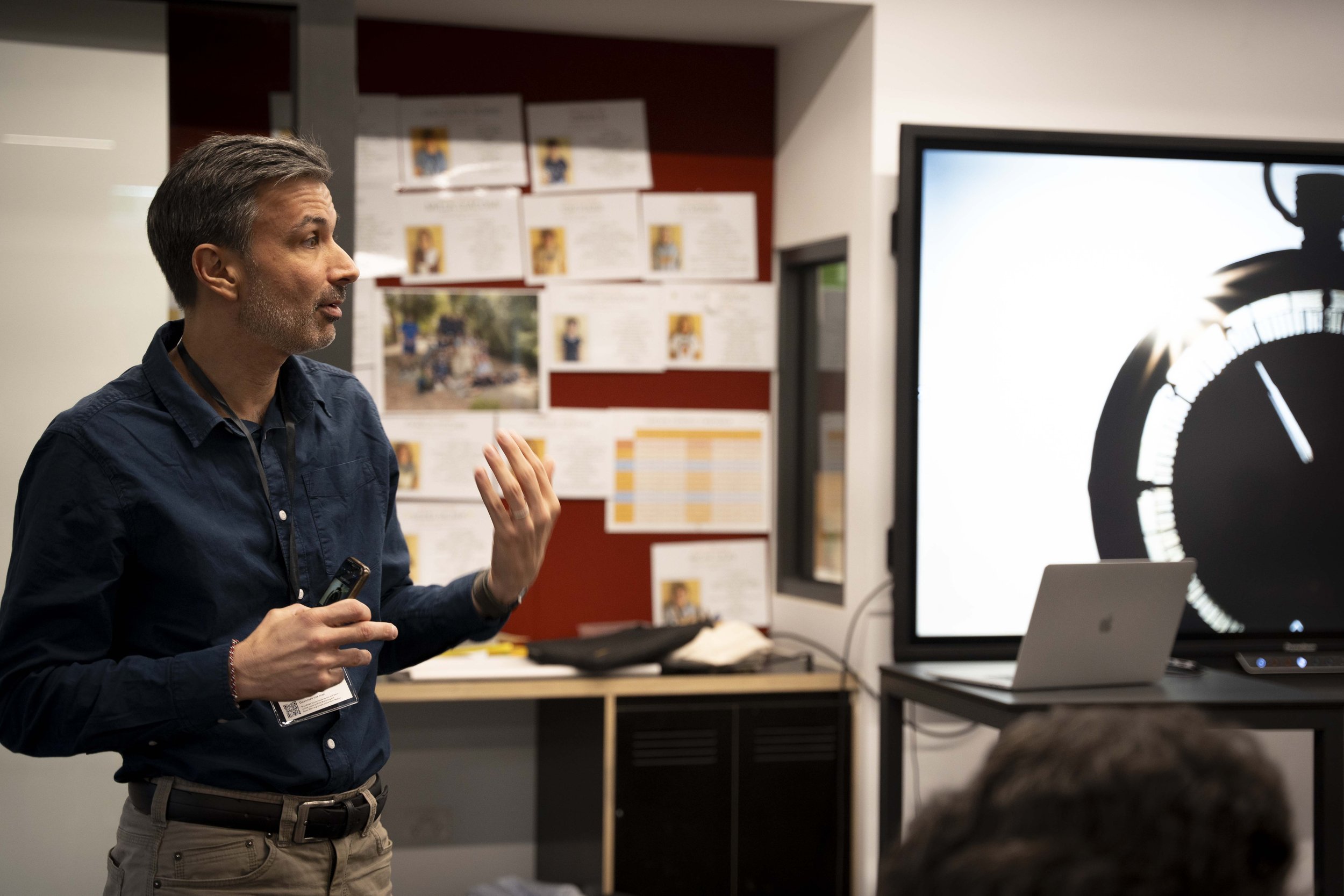

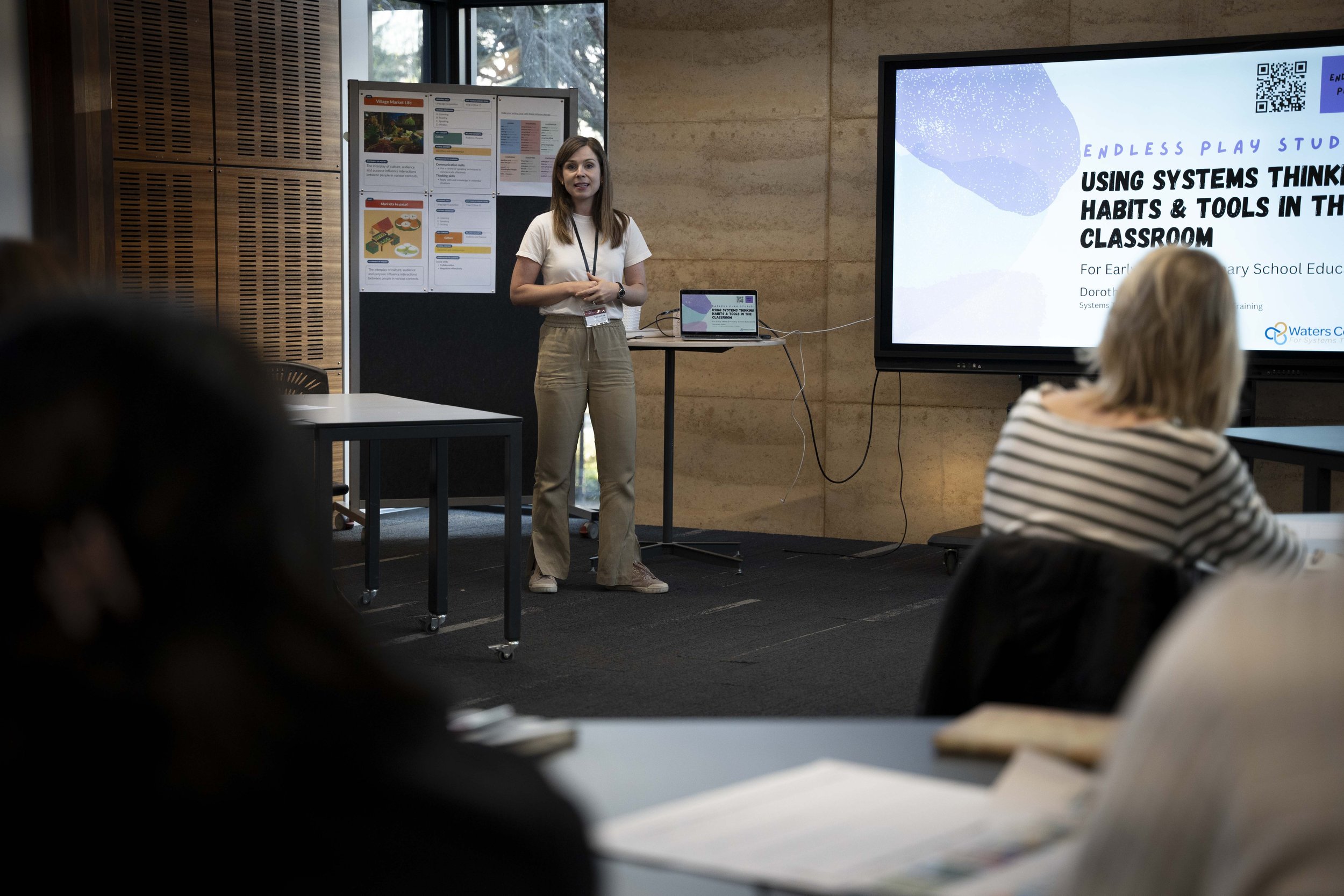
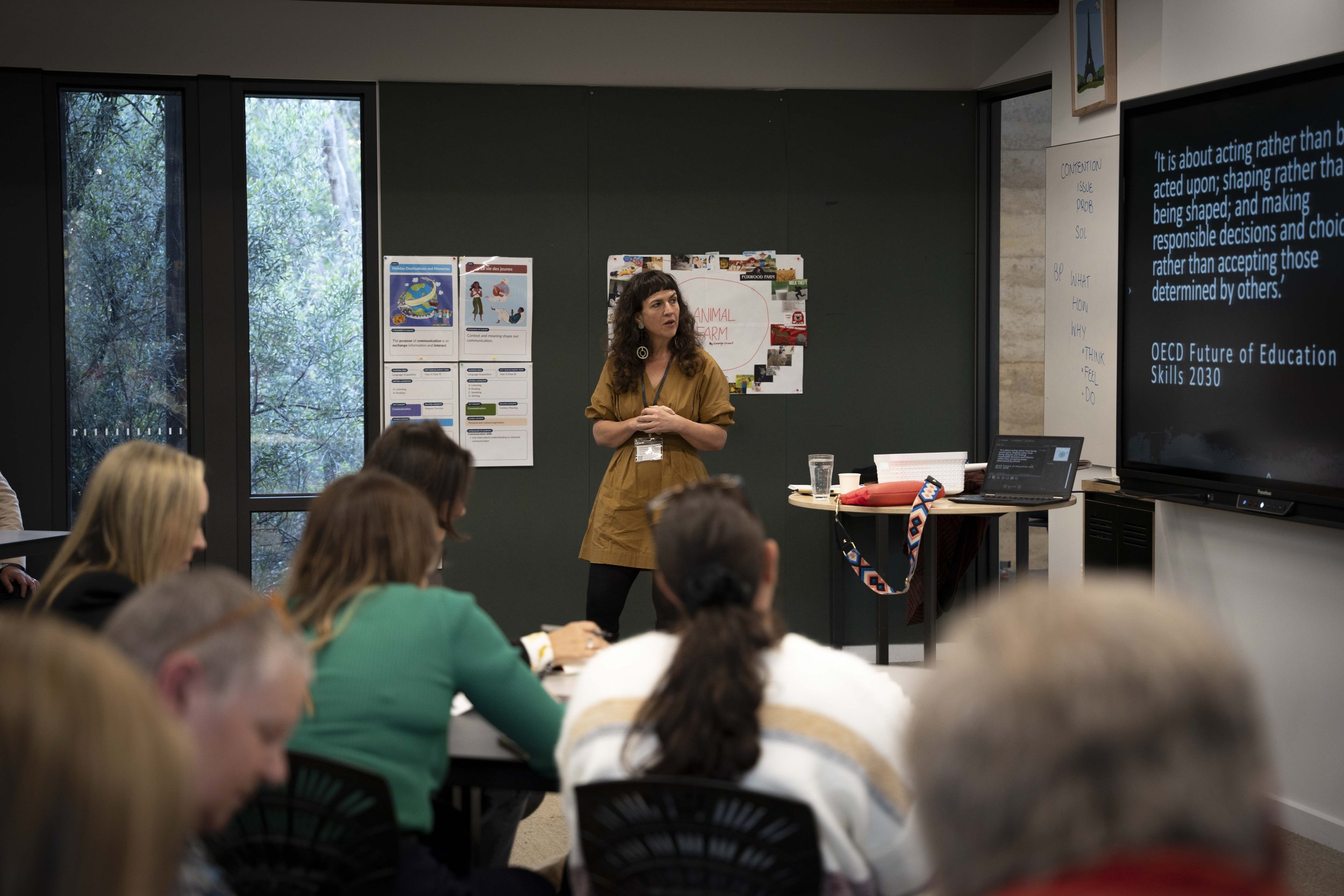
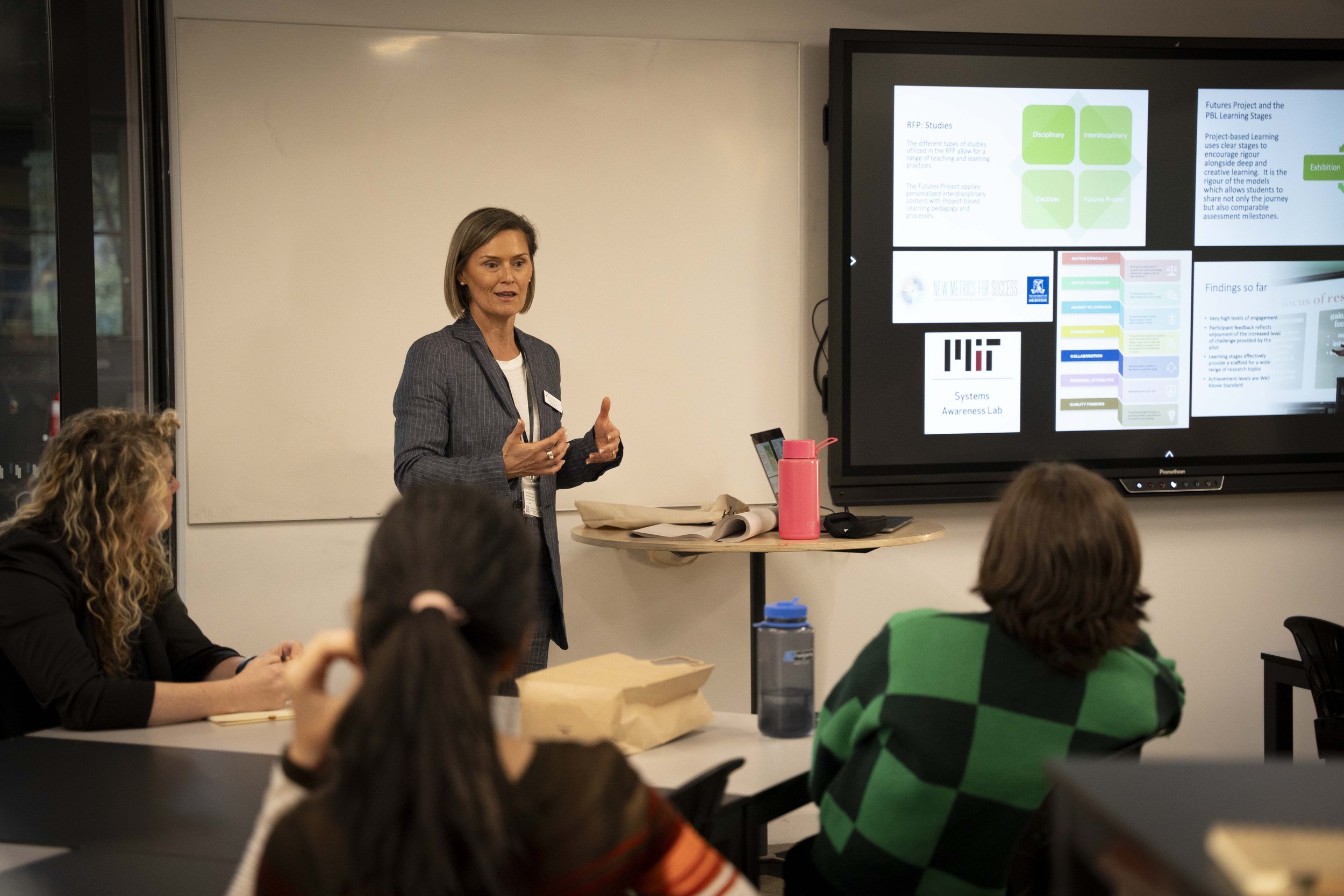
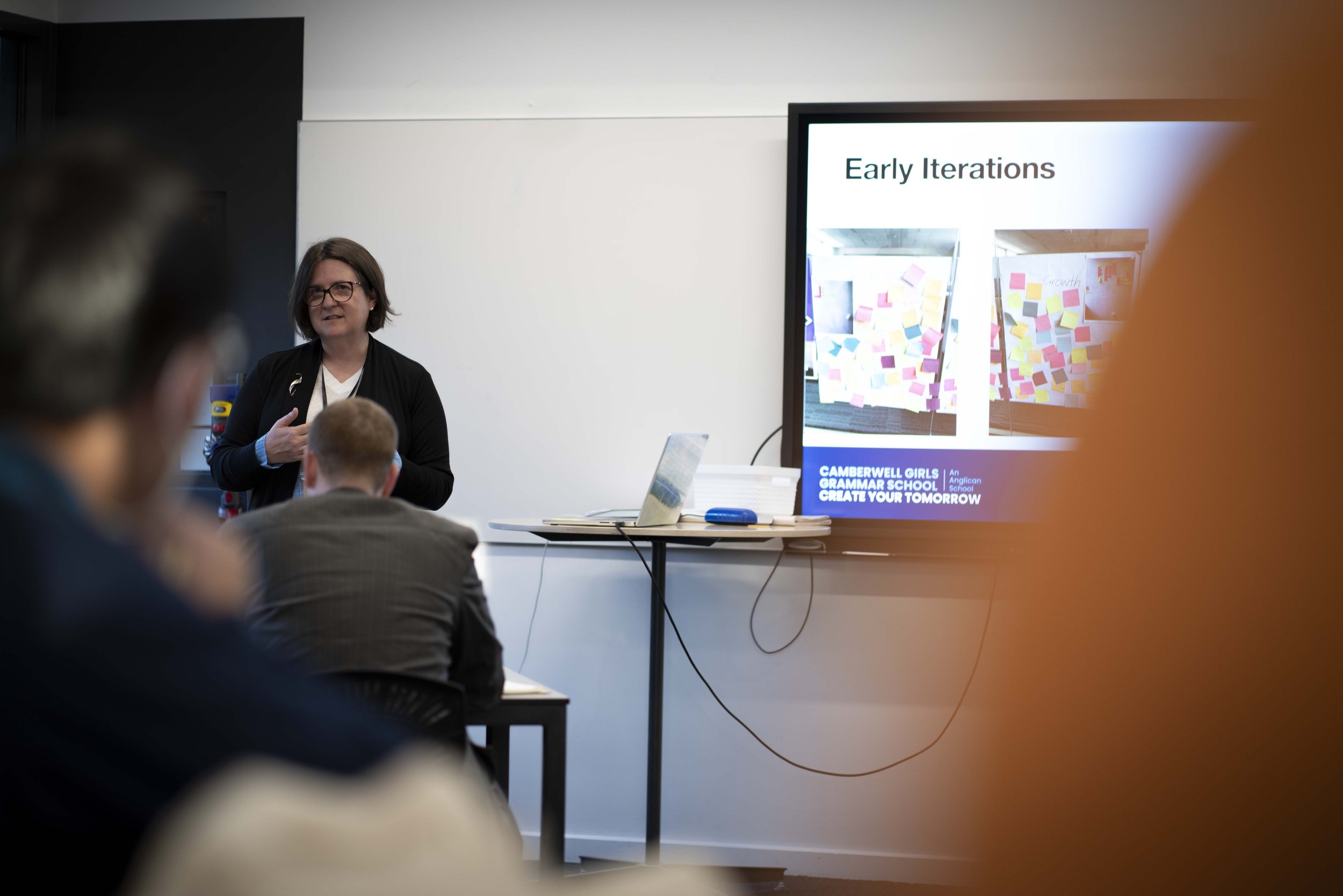
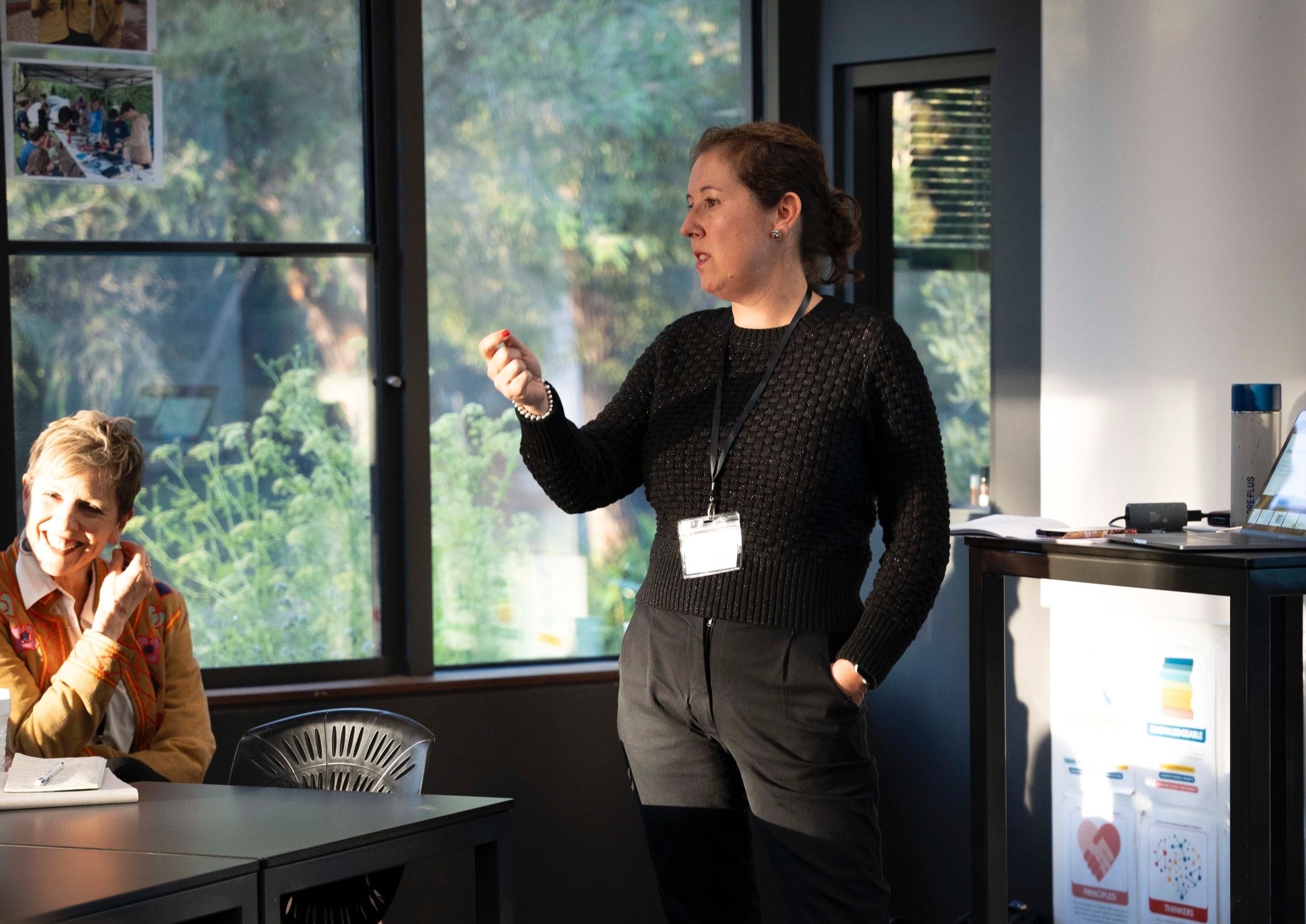
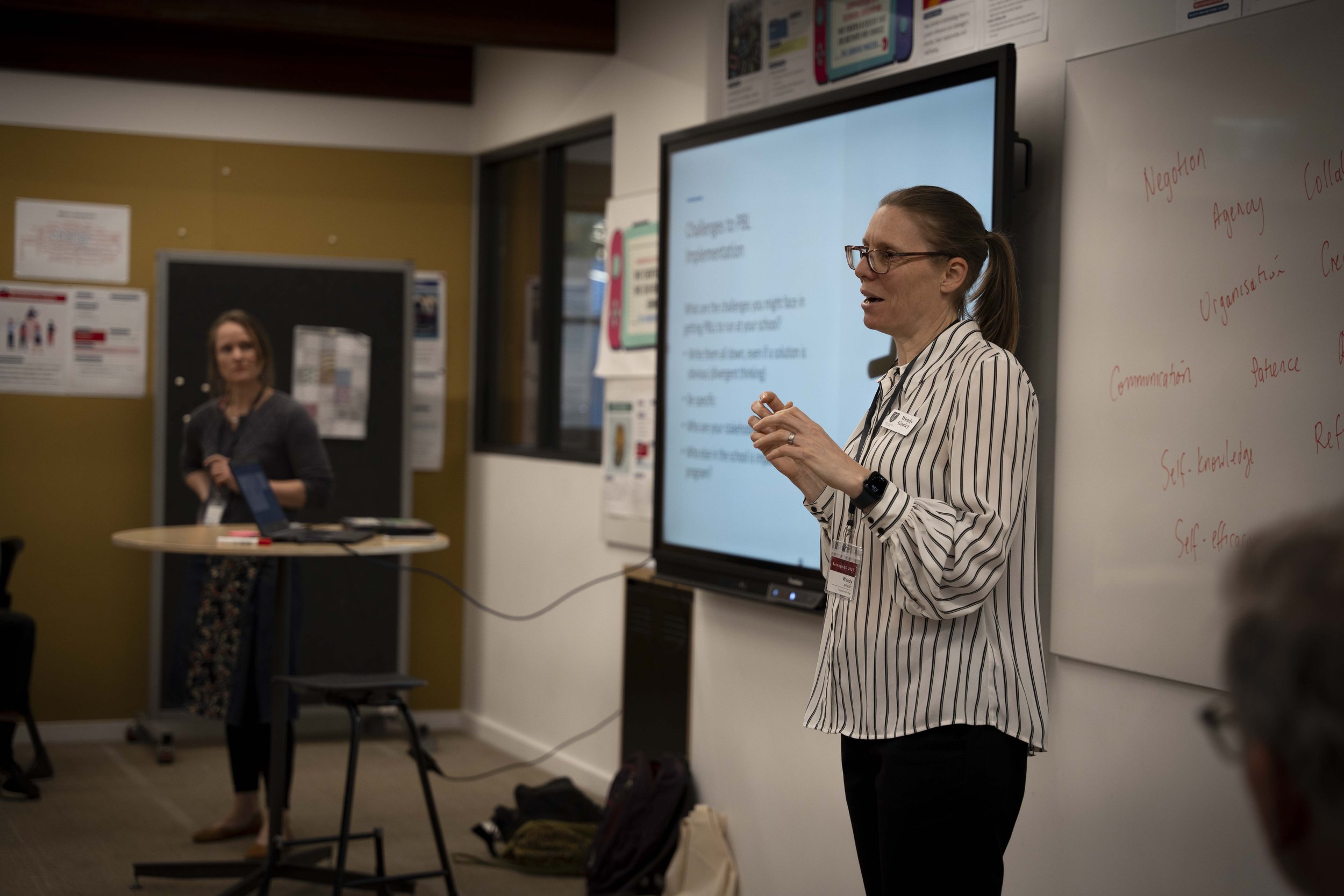
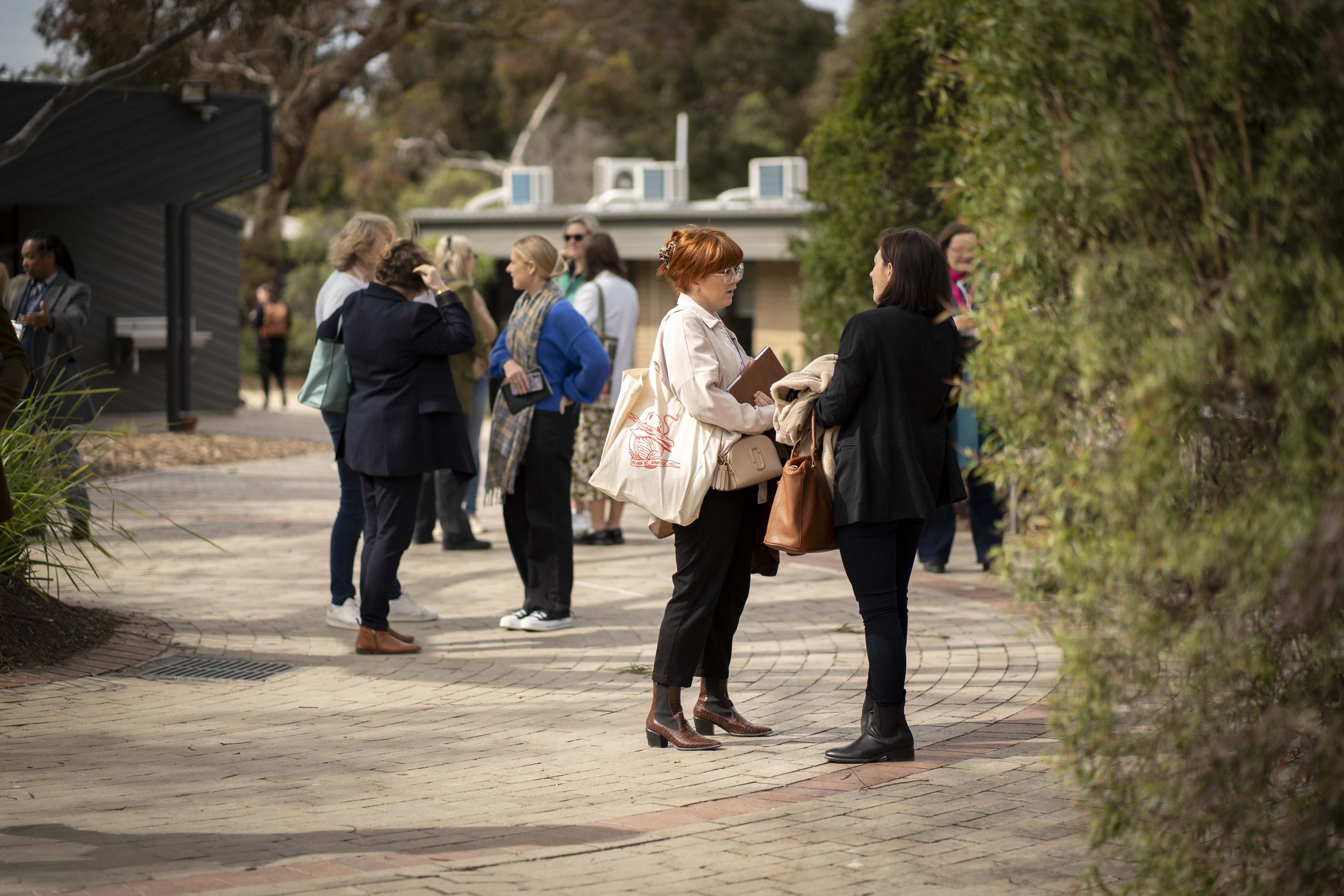
Performance - Kavisha Mazzella AM
One of the highlights of the Friday program was the performance by Australian singer-songwriter, folklorist, activist, and choir leader, Kavisha Mazzella. Through a combination of song and storytelling, Kavisha reflected upon her long career, starting from her early forays into music at school through to her immersion in the arts scene during college, and her emergence as a professional musician. The set of songs also traced her travels around the world and through the Mediterranean, Gypsy, and Celtic musical traditions that have influenced her craft as a singer-songwriter. Kavisha’s performance provided a testimony to the unique power of song as a forum for sharing and celebrating insight into culture, identity, community, and the human condition. By the end of her session, Kavisha’s irrepressible energy had drawn the conference participants into communal singing, providing them with an opportunity to connect, co-create and, most importantly, simply enjoy the moment of being together.
Conference Reception
The Friday program closed out with the conference reception. The venue for the gathering was a nordic-inspired, triple tipi, set against the beautifully lit bushland setting of Woodleigh’s Senior Campus. The social session provided an opportunity for participants to catch up with old friends and meet new colleagues, while enjoying fine food and drinks. The reception provided the chance to warmly welcome the participants who had journeyed long distances to be part of the event, especially the travellers from interstate, Singapore, Malaysia, the United Kingdom, Thailand, the United States, Indonesia, and Denmark. A highlight of the reception was the performance from one of the student rock bands at Woodleigh, Map to Neverland.
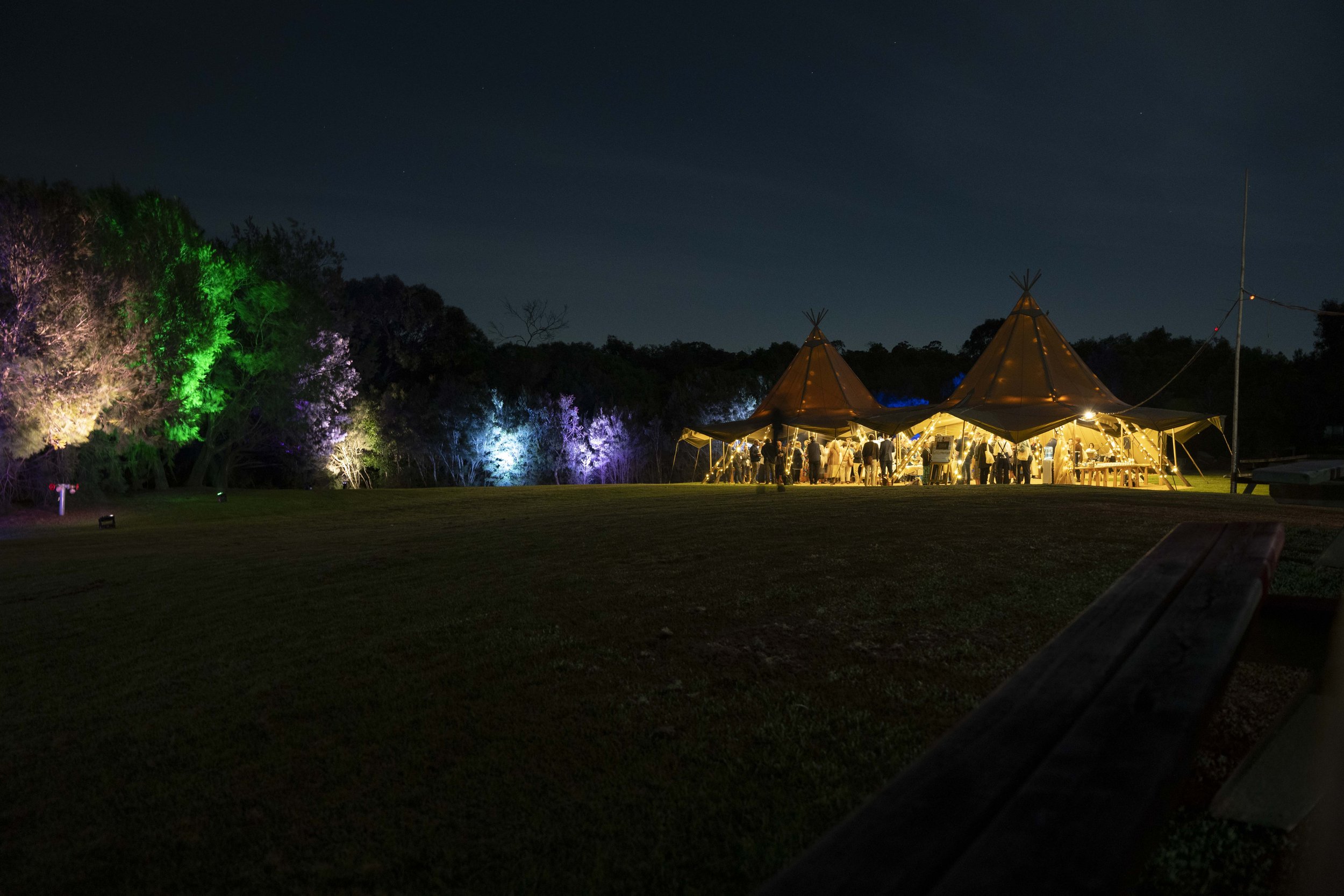
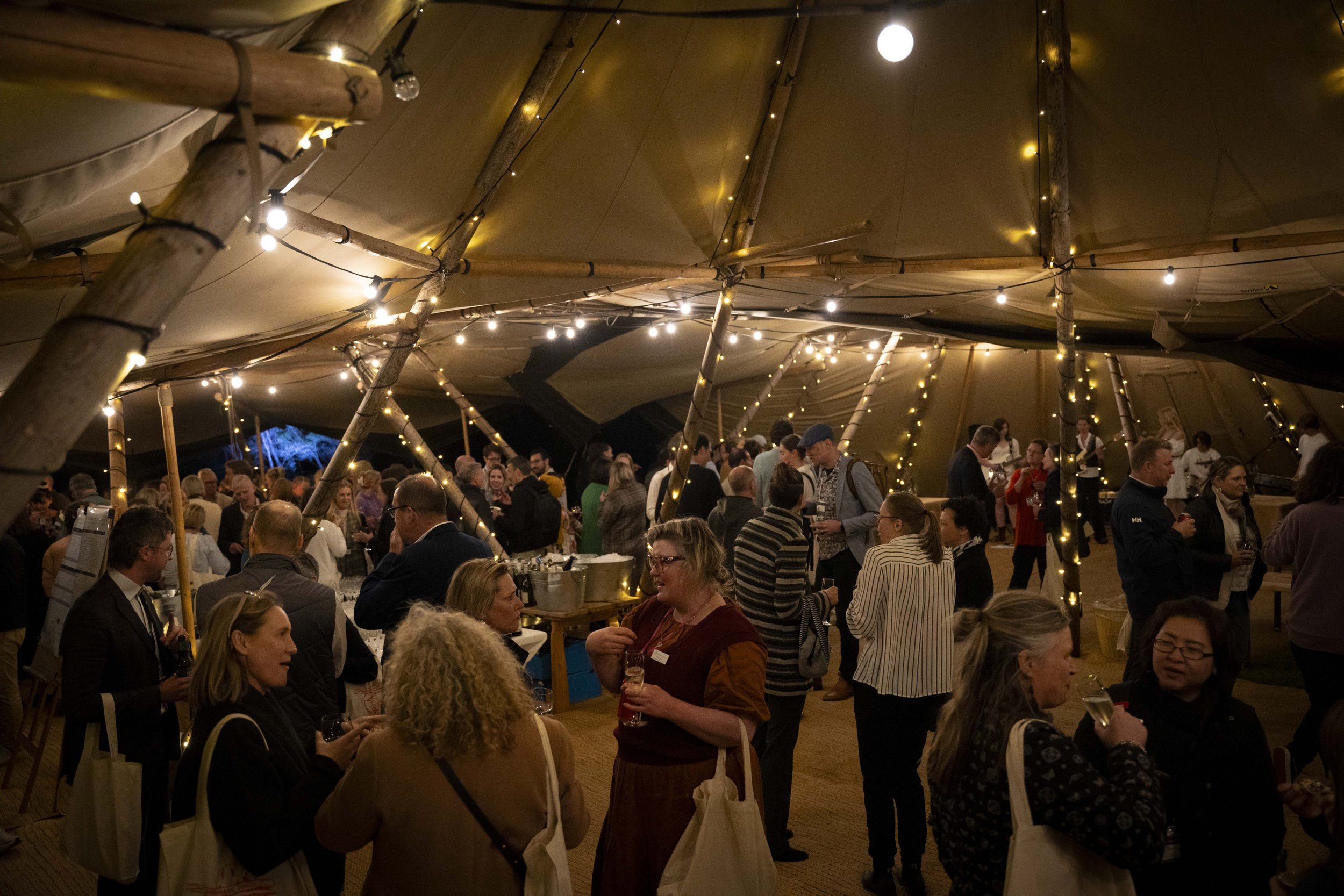
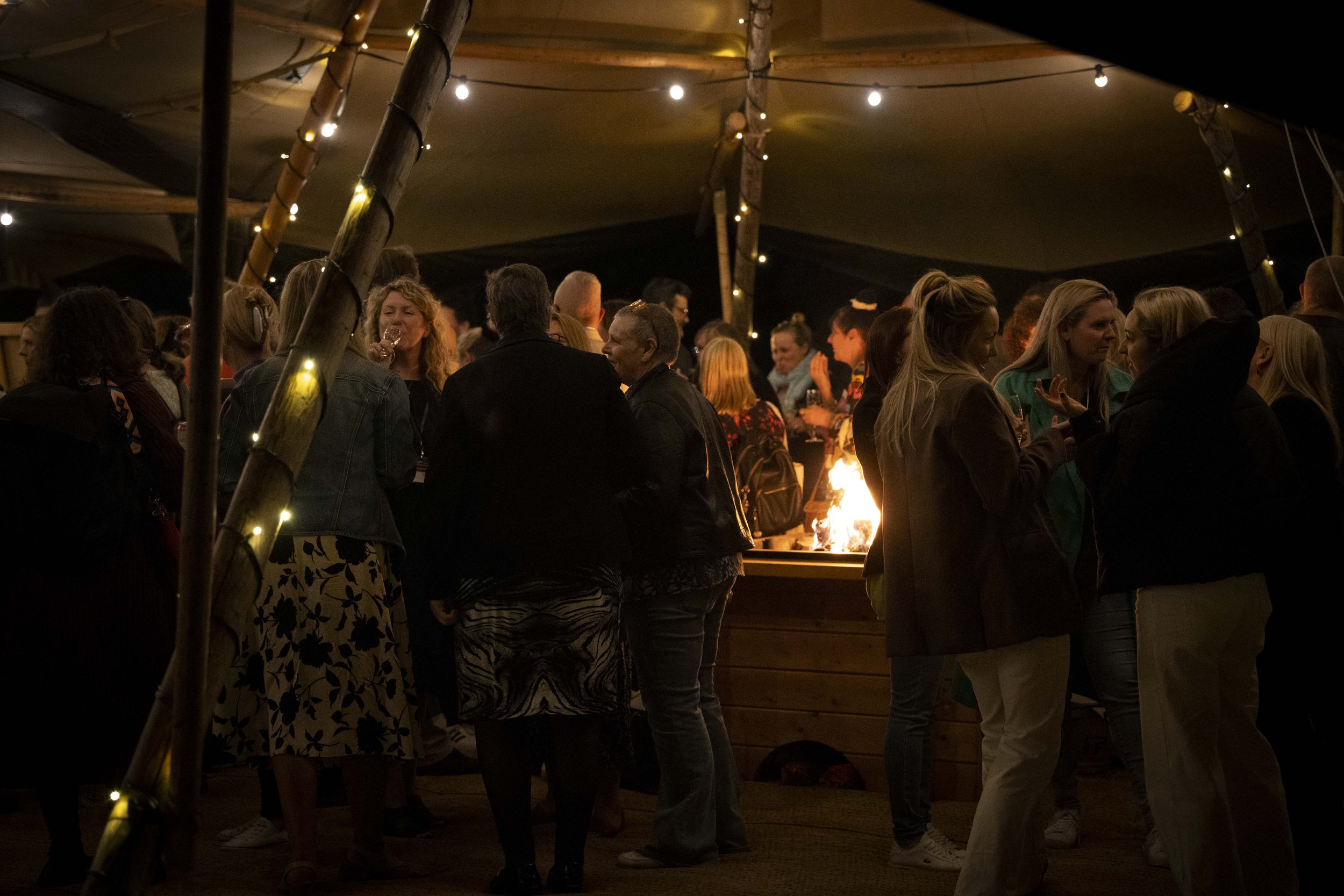
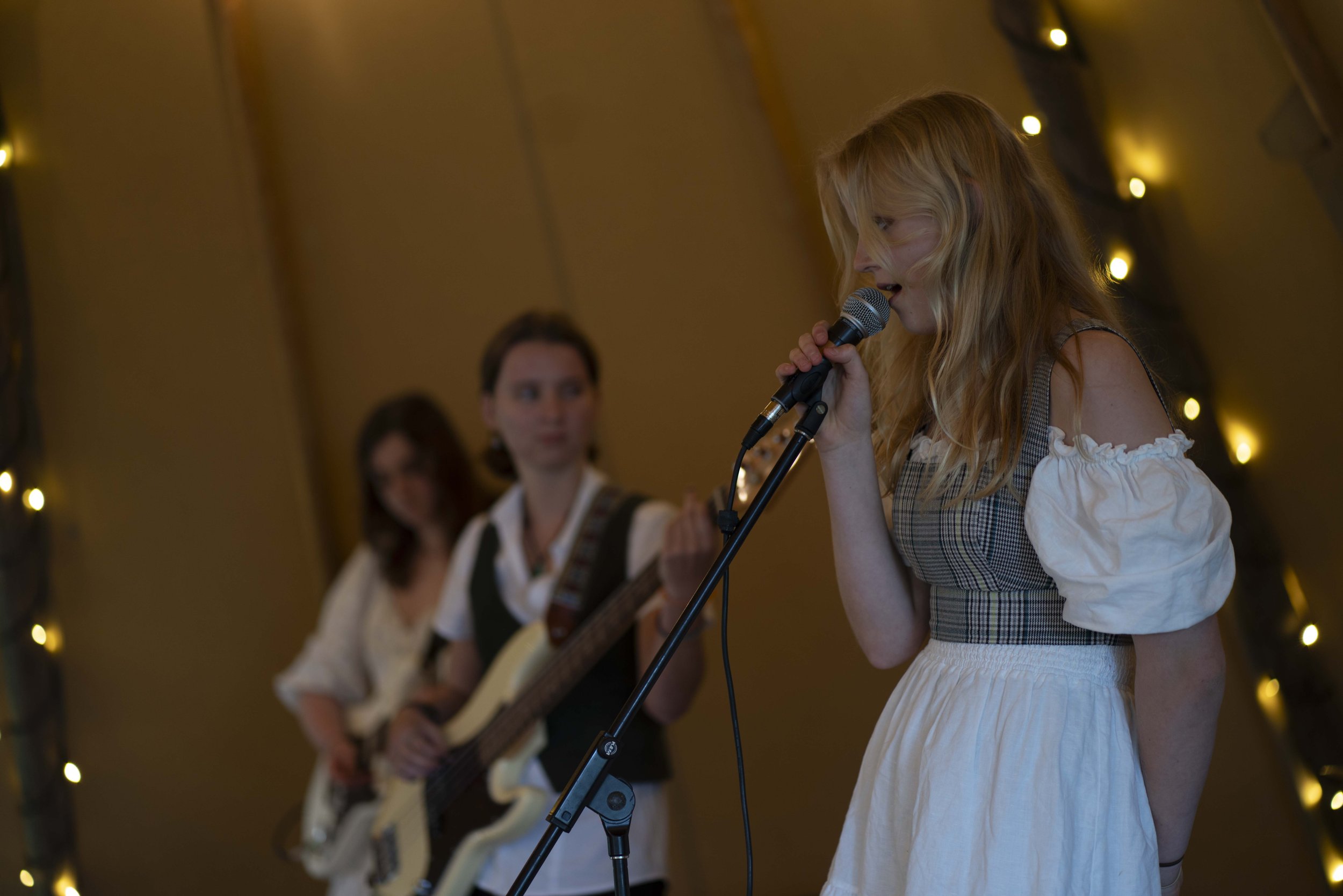
Main Conference Day
The Future of Schooling: Navigating Complexity to Foster Regeneration - Louka Parry and Dr Anne Knock
In the opening provocation on the second day of the conference, Louka Parry and Anne Knock explored how the work of educators might evolve to better support the growth of schools where young people can thrive. The session began with an invitation to engage in a breathing practice designed to support participant engagement through promoting somatic, emotional, and relational awareness. The speakers reflected on the value of this practice for developing systems awareness - an understanding of the interconnections between our selves, others, and the world in which we live. Louka and Anne went on to explore how this type of thinking might apply more broadly in education settings and the potential for adopting more systems-based responses to the complex challenges facing schools in areas such as equity and student mental health.
In the second half of their provocation, Louka and Anne presented a regenerative model for education that they are using with schools interested in moving towards the development of more healthy, resilient, and adaptable cultures. At the heart of their model is an eco-cycle that is designed to move school programs, practices and structures through a natural process of birth, maturity, creative destruction, and renewal. As a final reflection, Louka and Anne reflected on the emergent nature of this type of work and the importance of living out the many questions it provokes as a way of moving towards a more regenerative future for students, teachers, and school leaders.
You can access the slides from this provocation here.
Morning breakout session
The breakout sessions on the second day of the conference explored topics such as effective collaboration, attachment theory, educational leadership, well-being, and systems awareness. Two innovative models of schooling were presented during the morning, showcasing the ‘school within a school’ model (ScotsX) from The Scots College in Australia and the compassionate, constructionist approach employed at the Darunsikkhalai School for Innovative Learning in Thailand. Participants were also able to learn about the Critical Conversations partnership, a ground-breaking initiative led by a coalition of public and private schools in the USA, focused on expert-led dialogue around issues related to equity, justice, and wellbeing. A highlight of the morning session was the spotlight session by the team from Woodleigh and McIldowie Partners who shared insights into the development of the new Regenerative Futures Program at Woodleigh School. The presentation featured a walkthrough of the design for the new learning precinct being developed for the program, including a world first organic school building - a carbon sequestering, zero-waste ecosystem of learning spaces that fosters endangered birds and butterflies, grows food for students, and cleans the air we breathe.
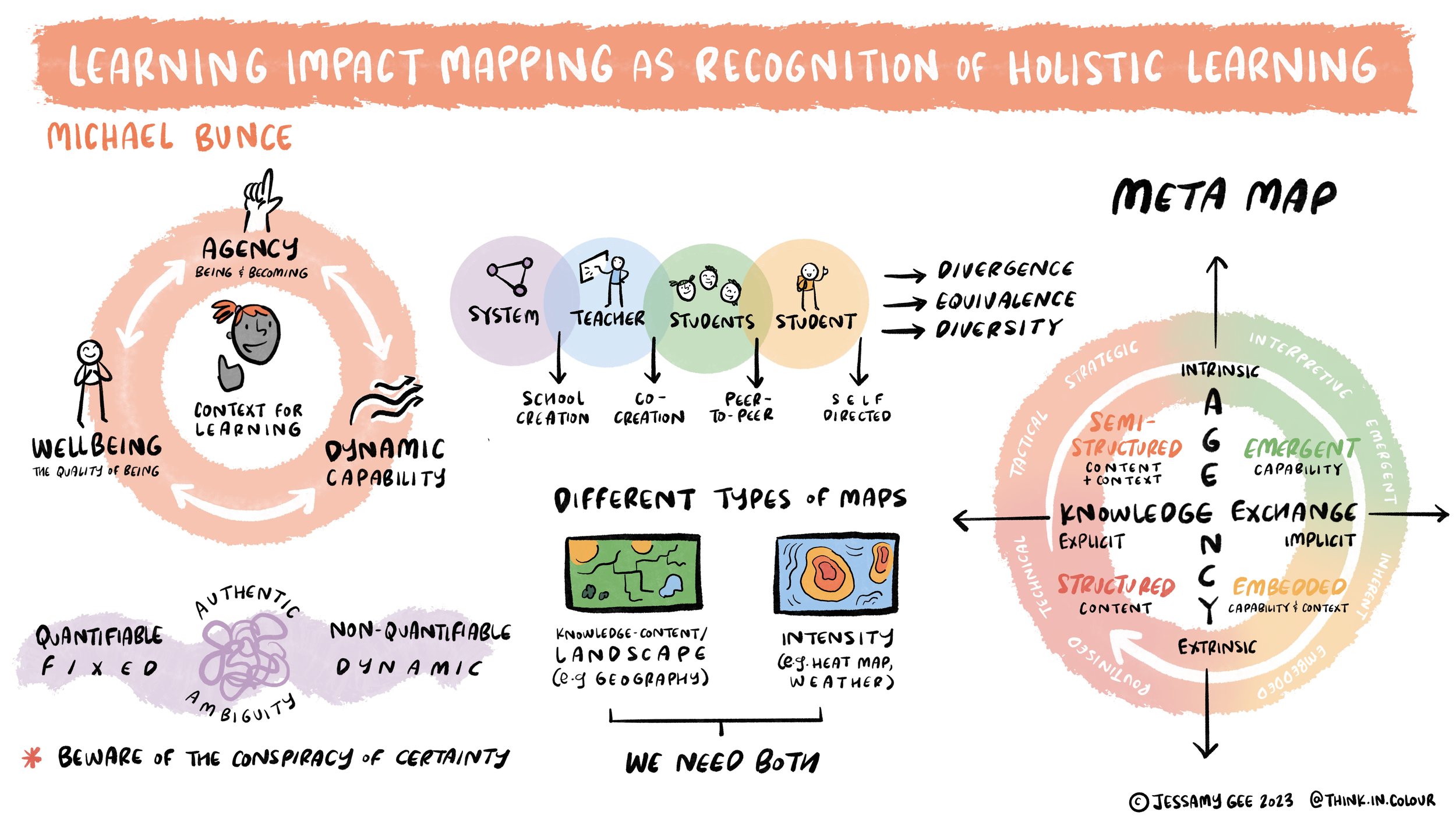
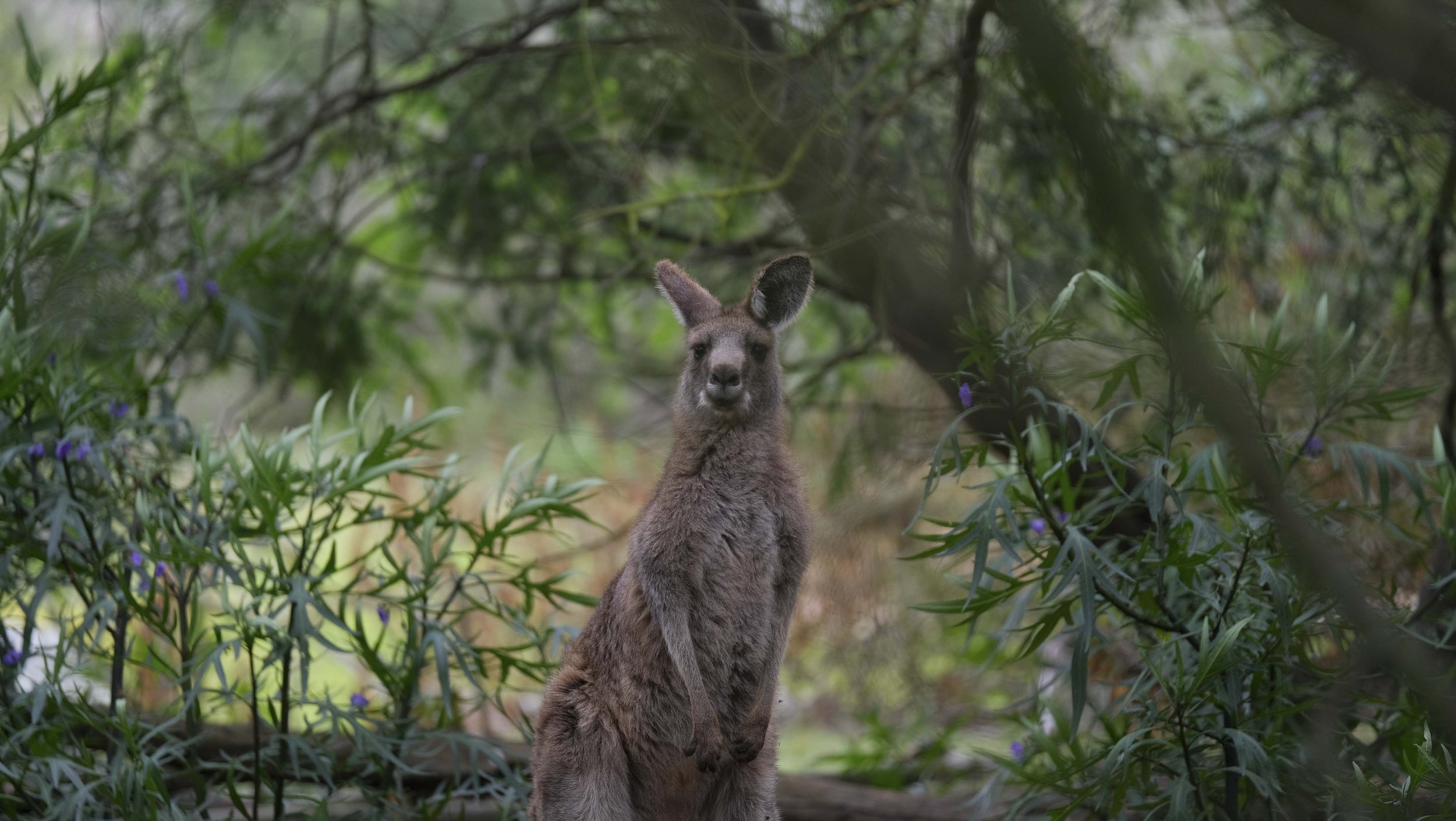
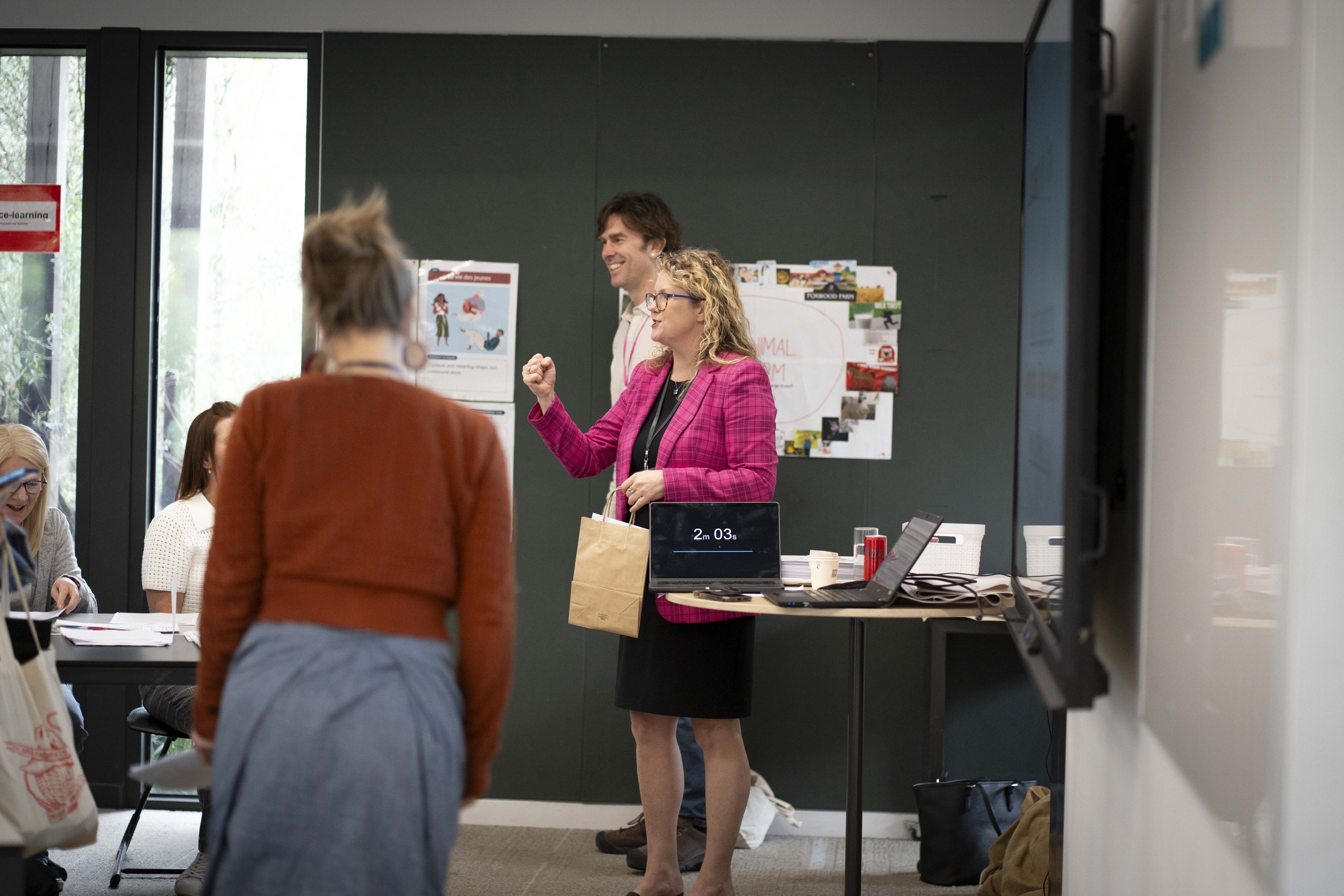
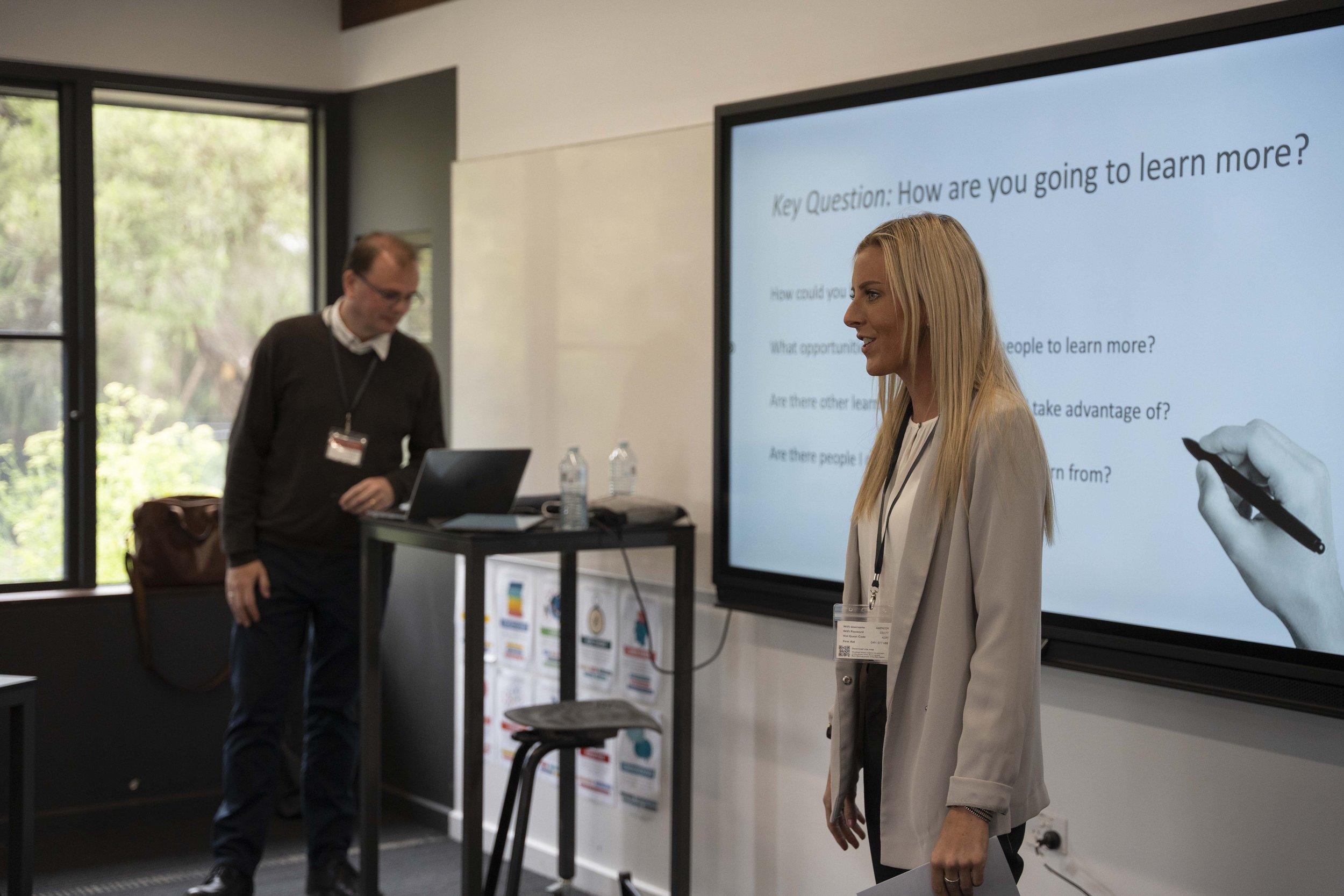
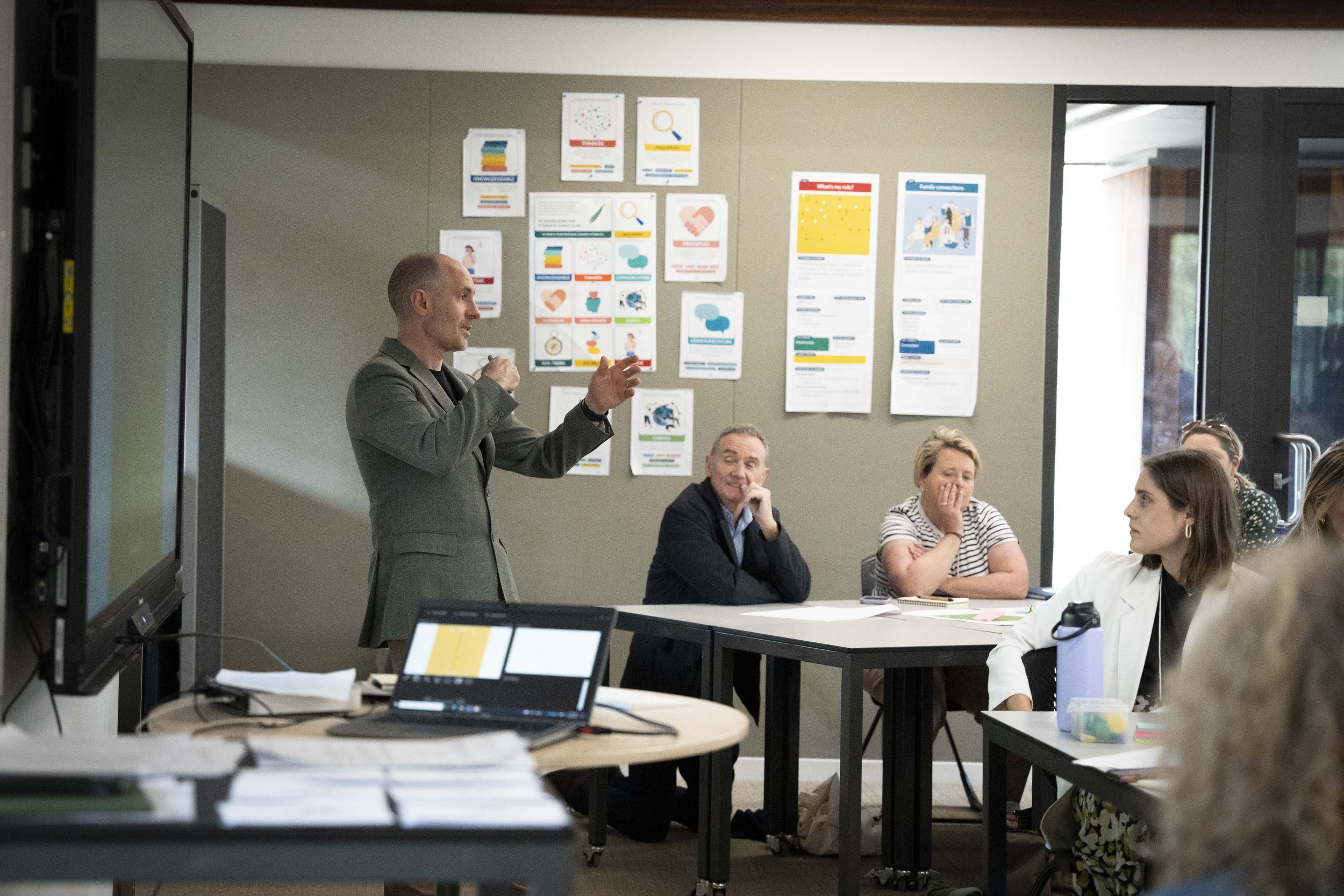
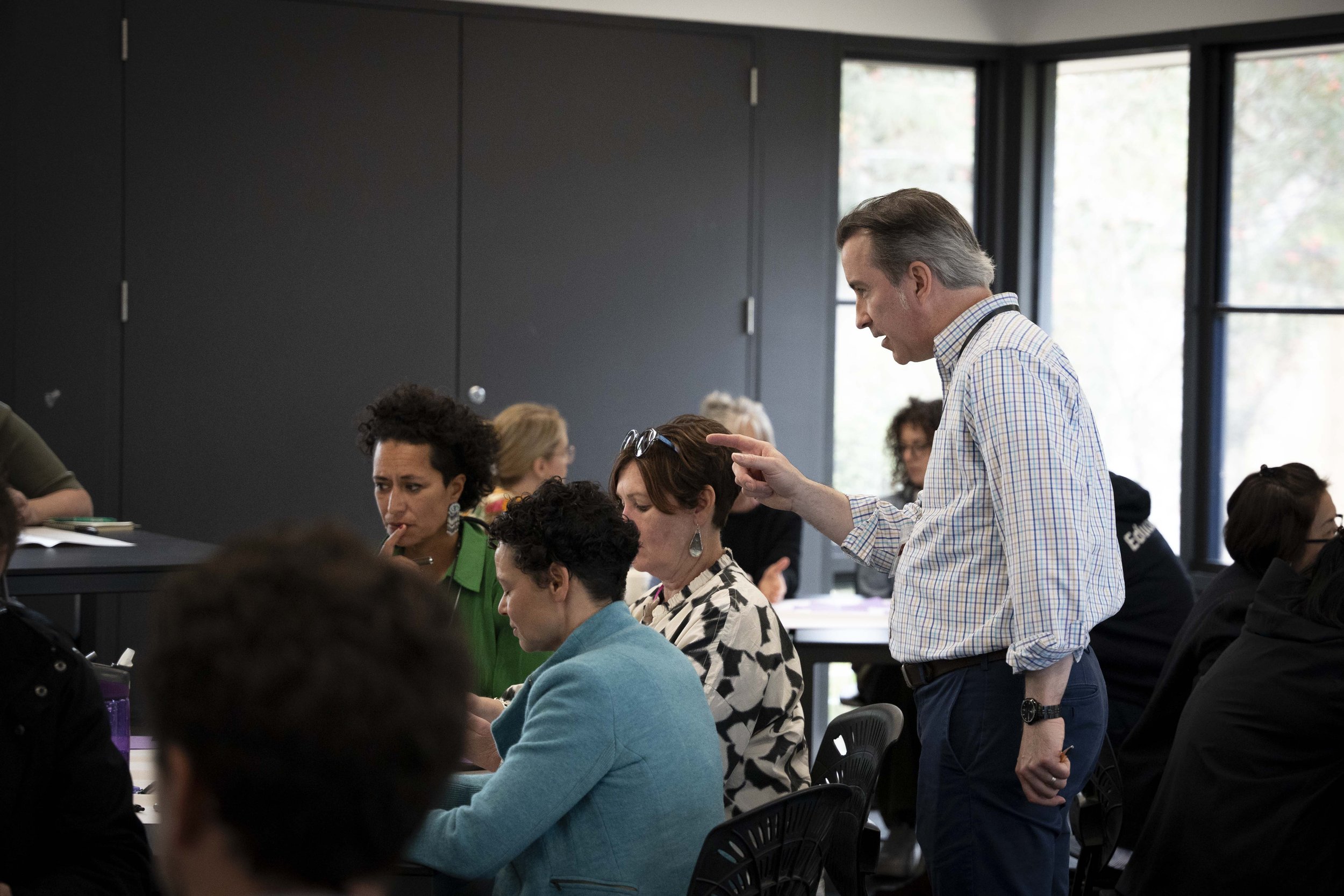
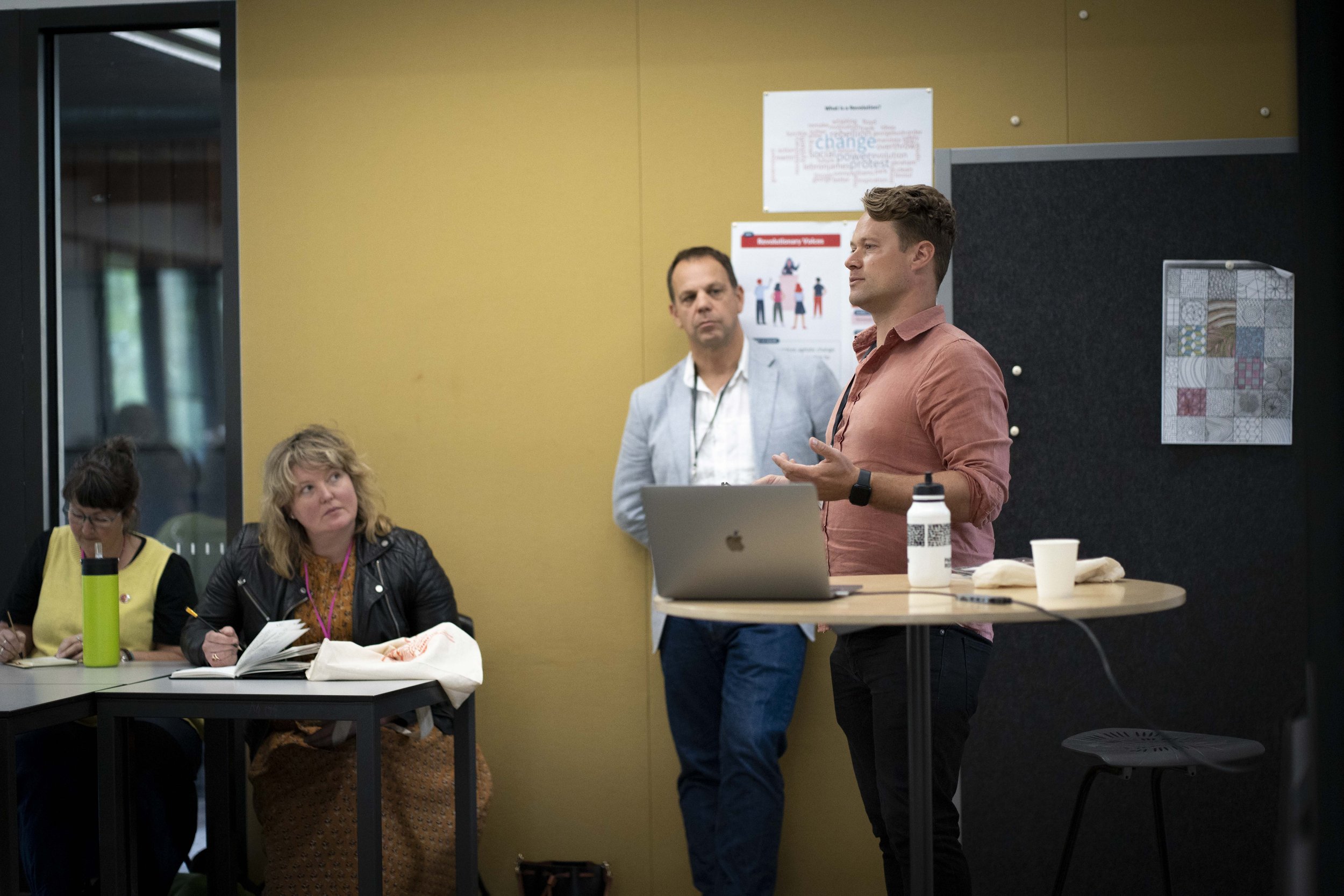
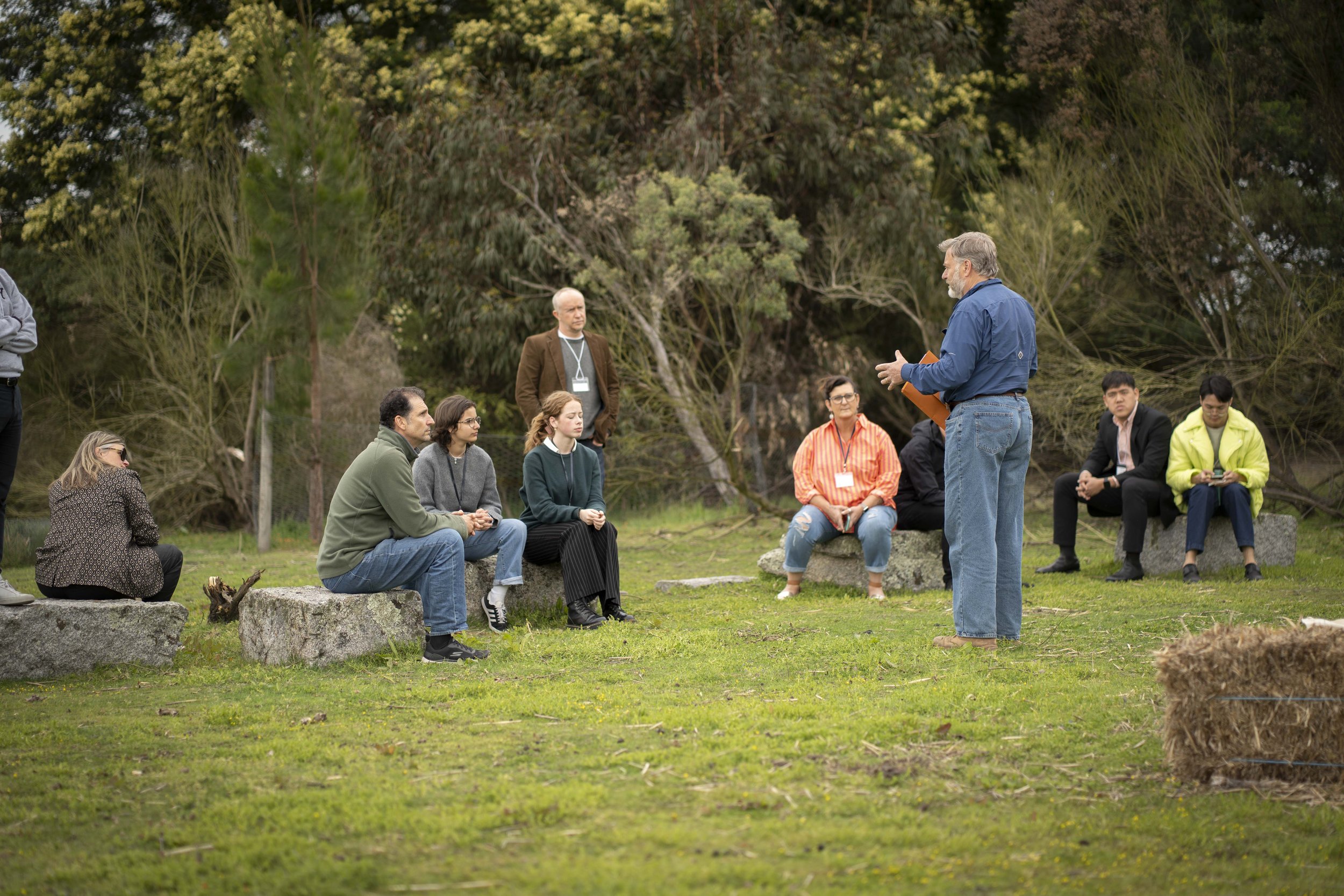
Midday breakout session
The final breakout session for the conference featured workshops exploring the topics of service learning, student and teacher wellbeing, service learning, co-agency, and sustainability. The themes of sustainability and regeneration featured strongly in the afternoon, including workshops from Cool Australia on hope and action, and Woodleigh School on the use of experiential learning design in the context of its unique Brian Henderson Wildlife Reserve. A popular spotlight session was hosted by leaders from Carey Baptist Grammar School, showcasing their new year long course, Carey Zero, featuring a 20 day immersive expedition to Northern Queensland. One of the most highly anticipated workshops of the conference was led by Michael Bunce who engaged participants in the exploration of the Learning Impact Project, a ground-breaking research project exploring the relationship between agency, transfer, and quality of being, and the potential implications for recognition of learning.
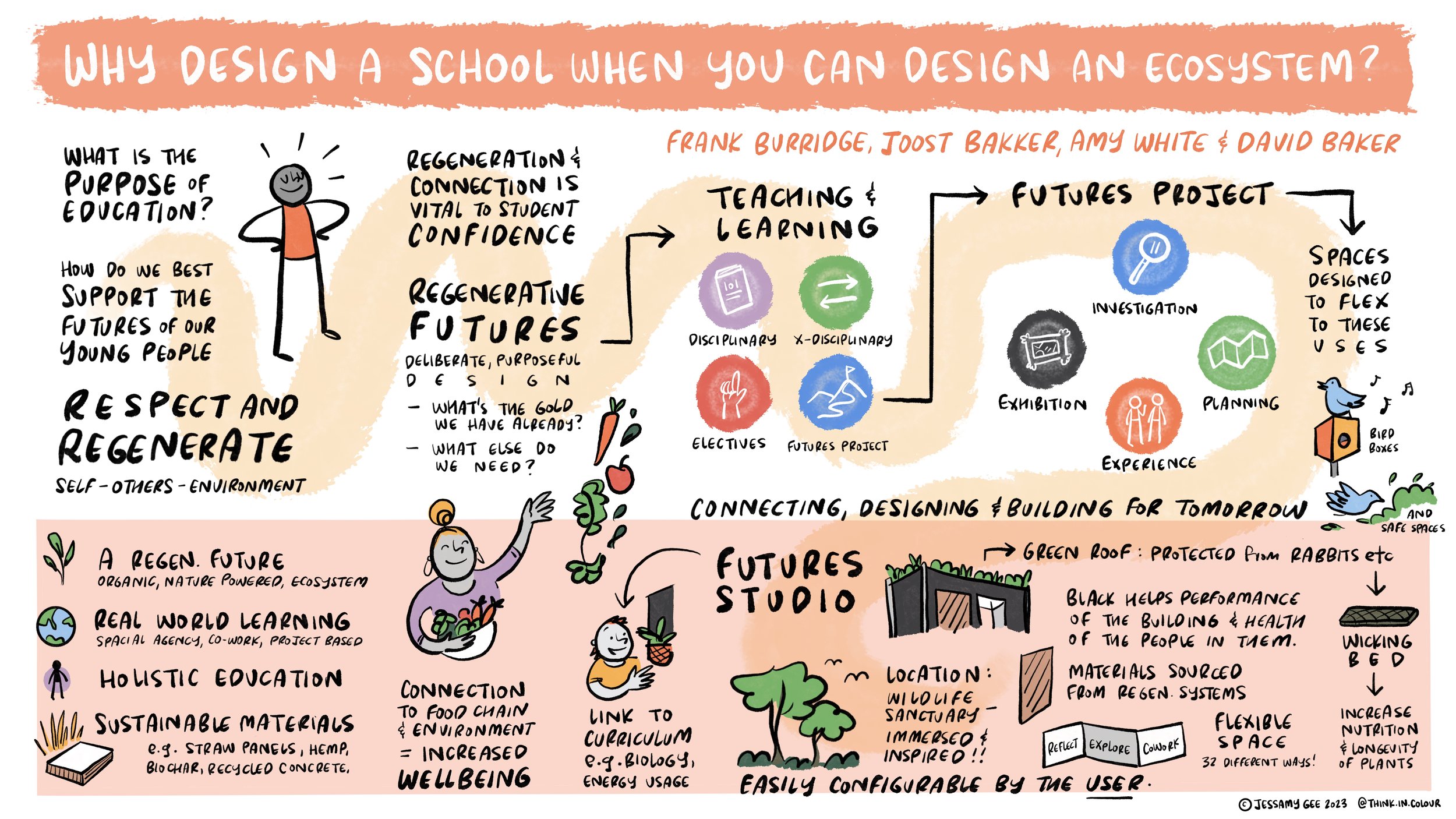
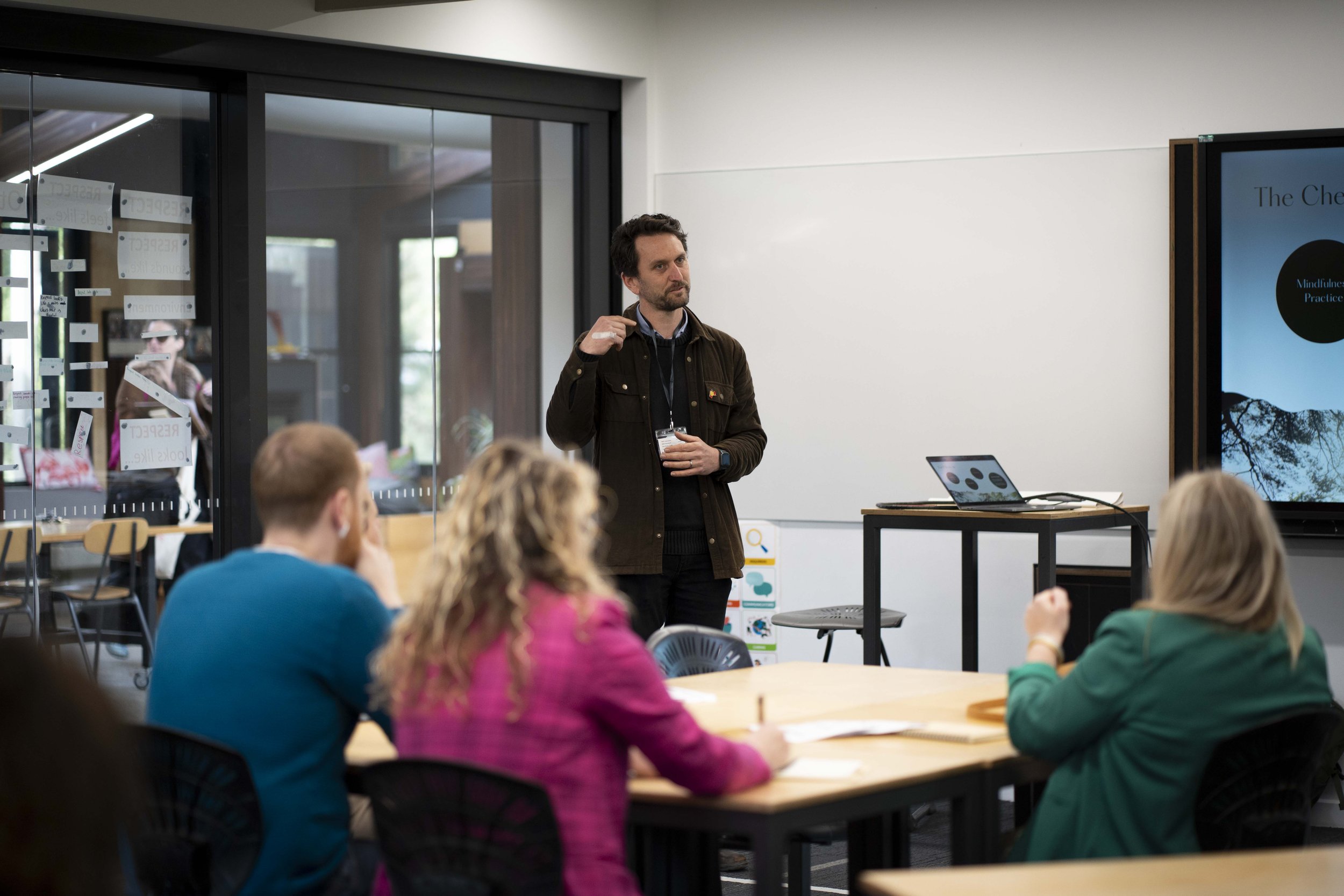
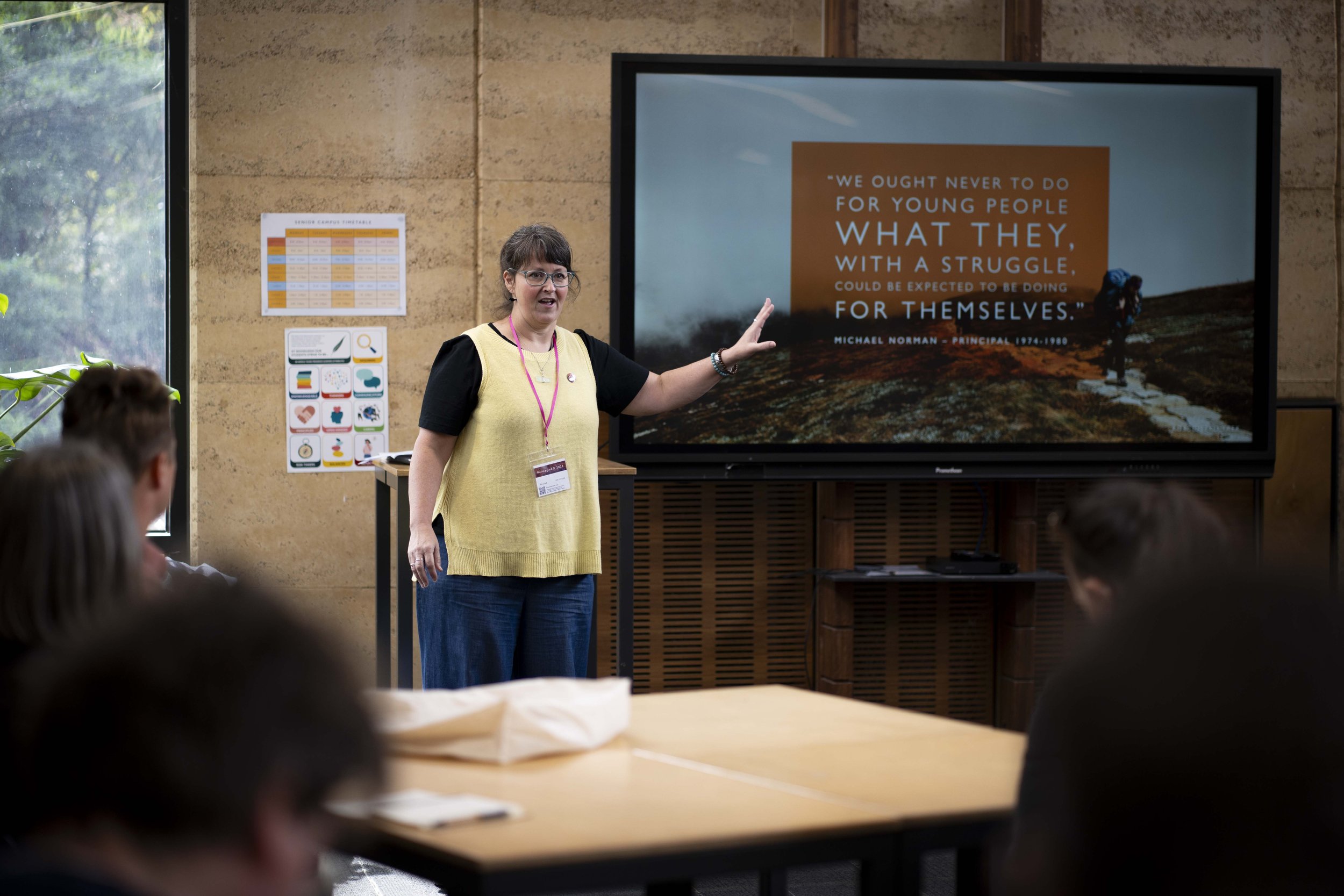
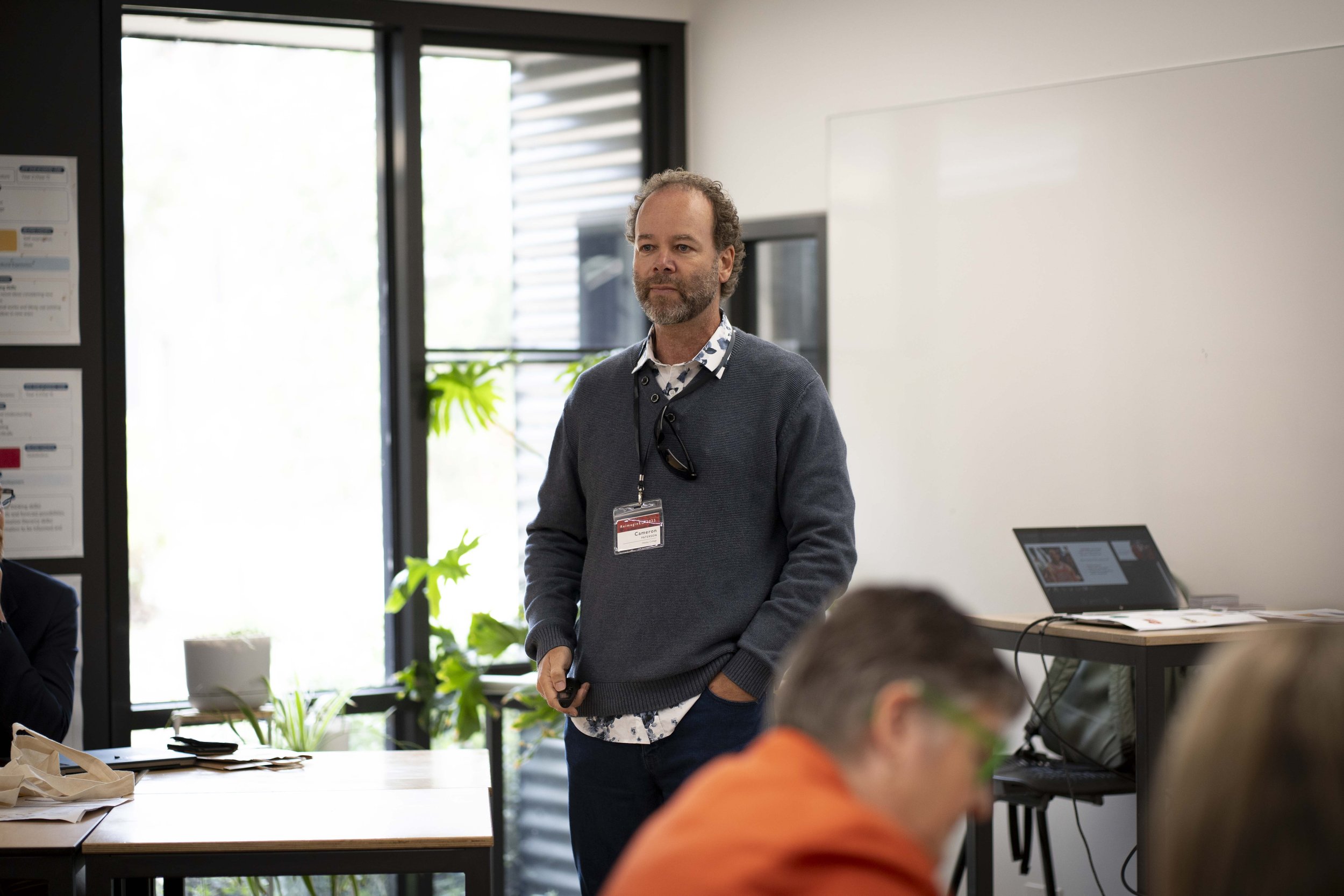
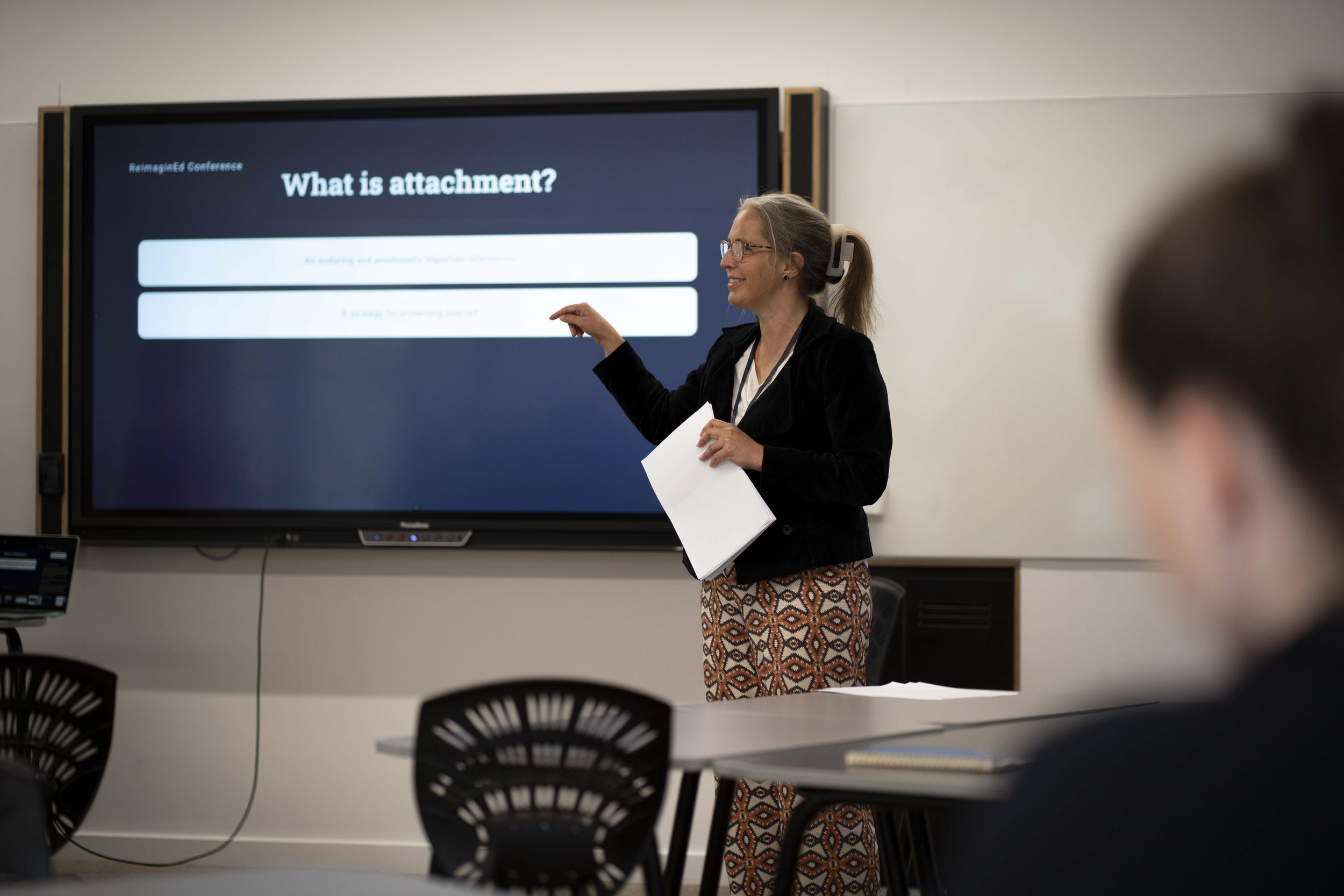
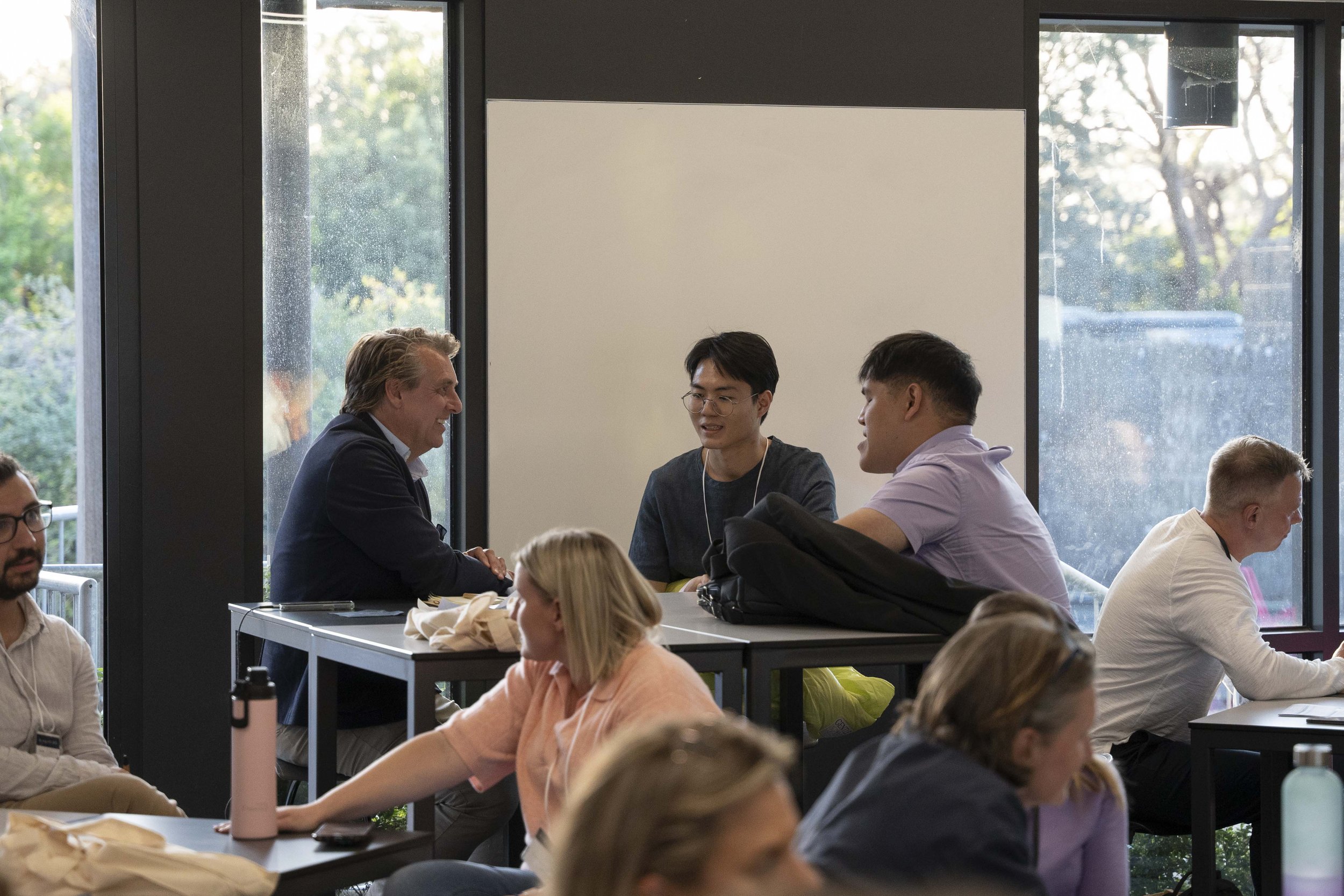
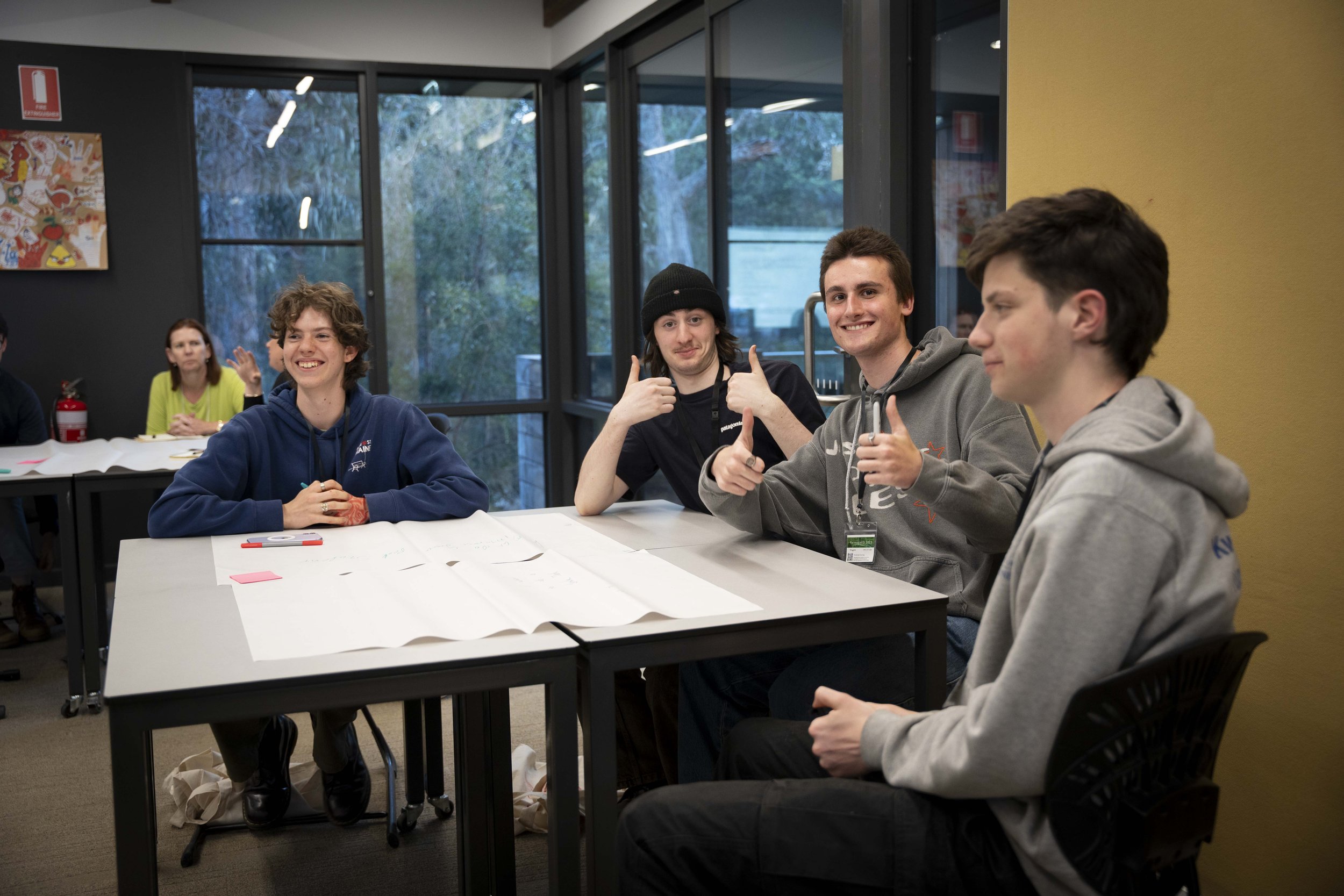
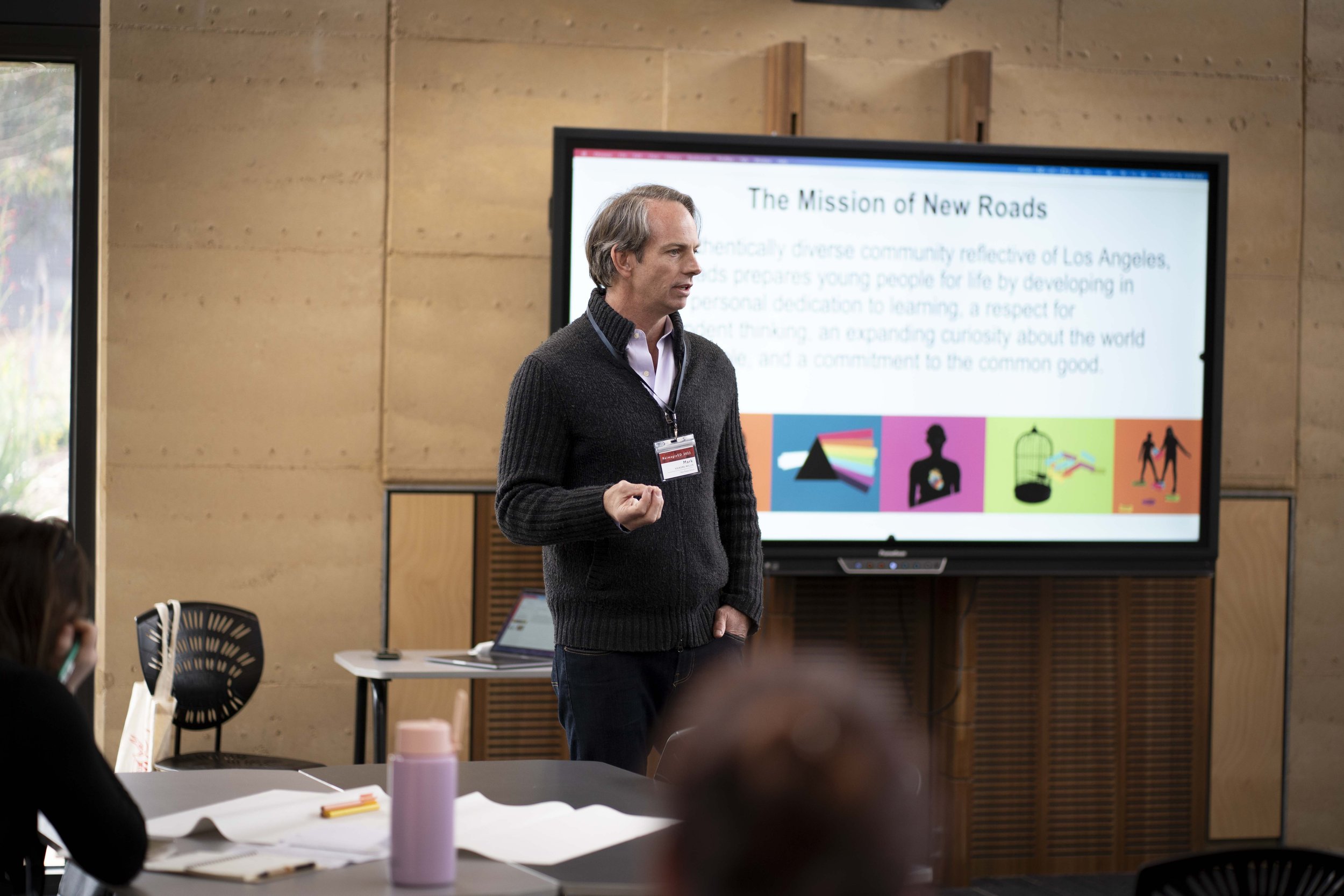
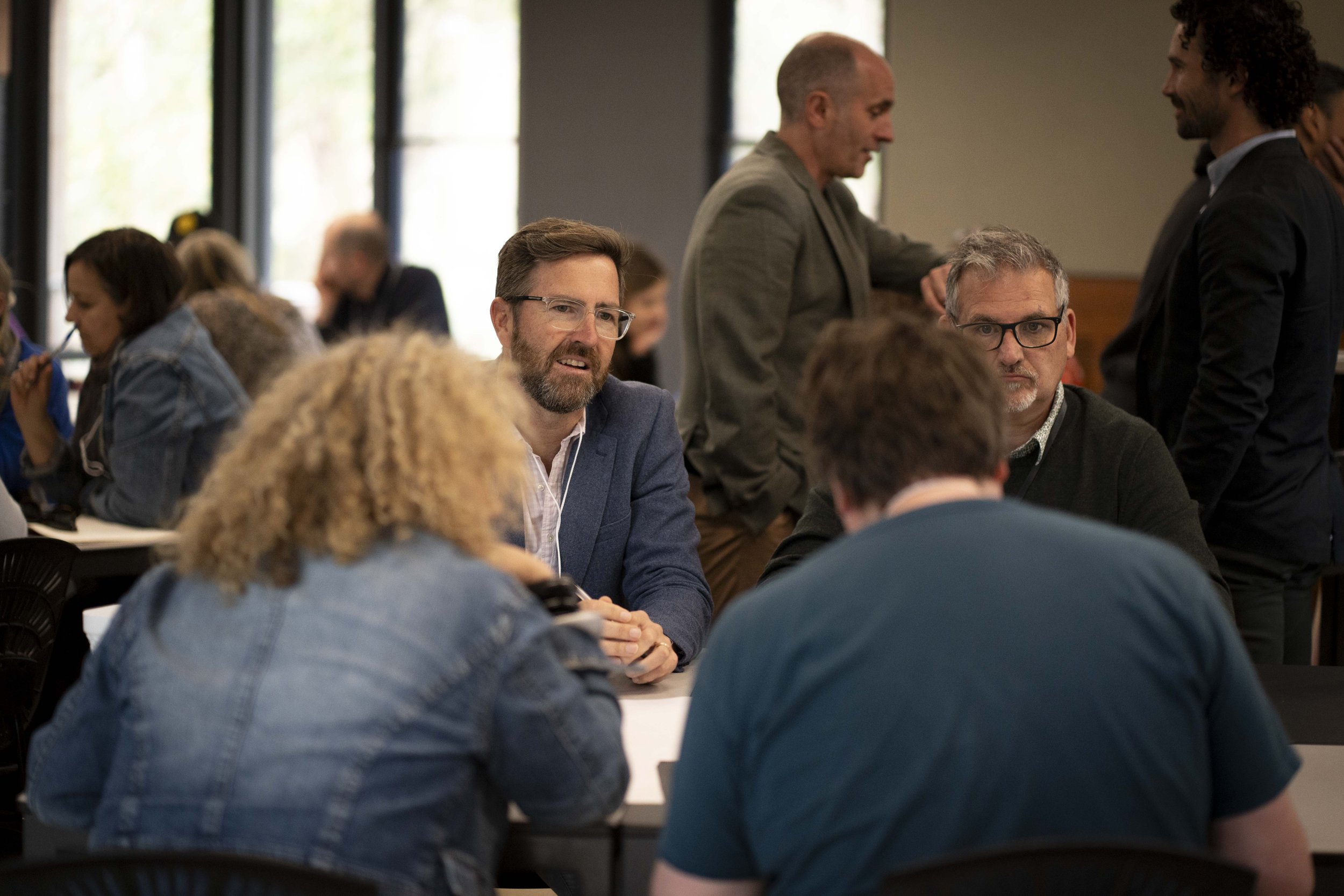
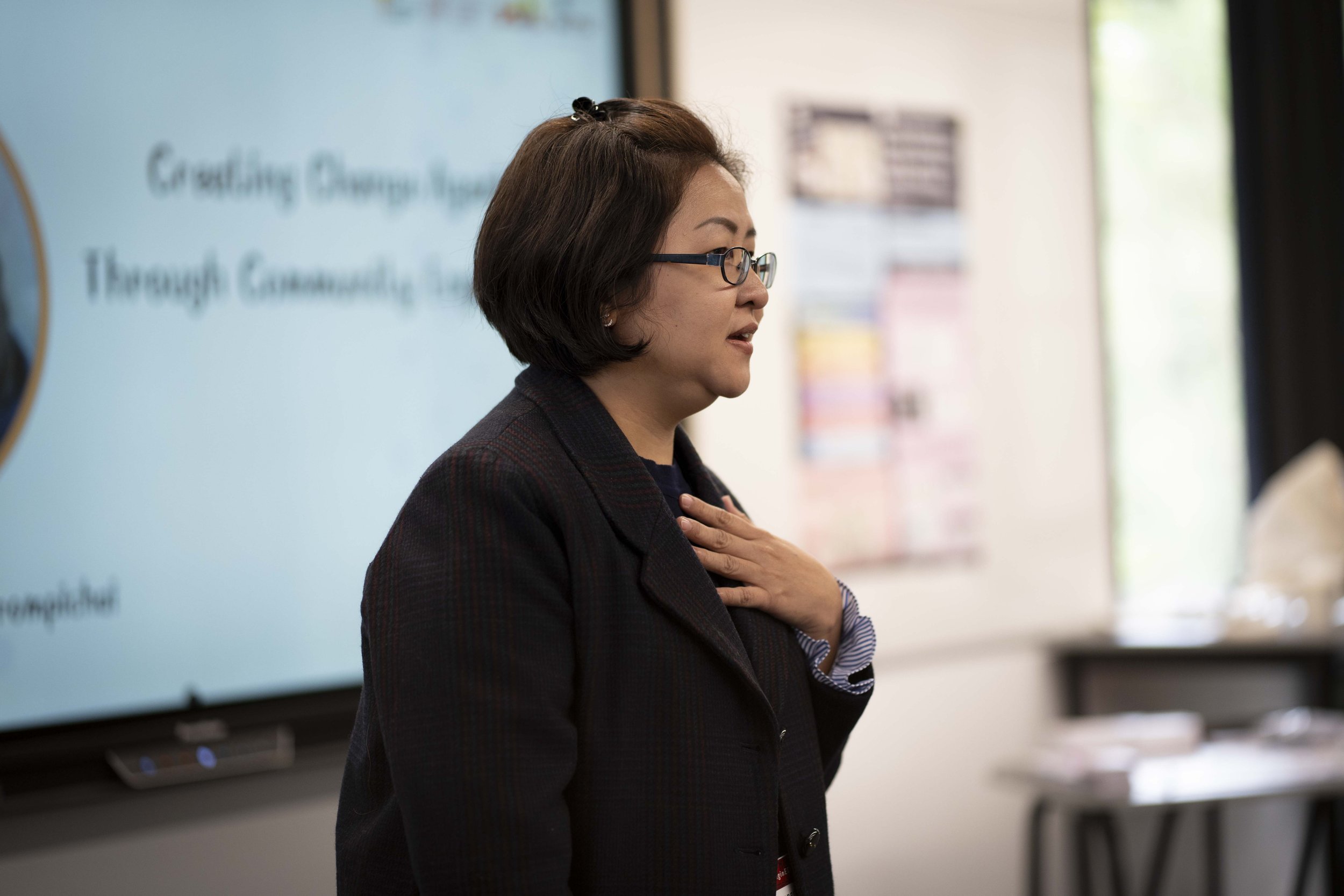
The Power of Us - Alex Bell and Leanne Hamley
On the final afternoon of the conference, Alex Bell and Leanne Hamley challenged participants to consider school effectiveness, innovation, and improvement through the lens of culture management, rather than change management. Their provocation began with an acknowledgement of the impact that people powered movements are having in many societies and a call to consider how we might create the right cultural conditions for more distributed and effective forms of leadership in our schools. Alex and Leanne shared insights from the research case studies that have informed their work, providing specific examples of organisations transformed through people-powered innovation, and insights into their shared characteristics, such as a clear focus on the elements of trust, autonomy, engagement, and meaning. The session featured opportunities for participants to explore the rituals, mantras, and artefacts that exist in their work context, and the extent to which they support cultural development and cultural aspirations. Alex and Leanne concluded their session with a reflection on the importance of adopting a generative stance and maintaining a focus on what you want to create, rather than being preoccupied with what you are fighting against, when leading school effectiveness, innovation and improvement.
You can access the slides from this session here.
Panel: Exploring Systemic Approaches to Wellbeing - Dave Secomb, with Mette Boell, Daniel Lukies, Nalin Tutiyaphuengprasert, and Alex Bell
The session after lunch on the second day was dedicated to a panel conversation exploring systemic approaches to wellbeing. The panel was led by Dave Secomb, the Principal at Tokyo International School, and featured Dr Mette Boell, Co-Founder of the Center for Systems Awareness, Alex Bell, Lead for Engagement at the Power of Us, Daniel Lukies, Director of Wellbeing at Woodleigh School, and Nalin Tutiyaphuenngprasert, Co-Founder of the Darunsikkhalai School for Innovative Learning (DSIL). During the discussion, the panel members explored the ways that we might restructure our education system to make schools community centres for learning, wellbeing and social justice, with attention to the work involved in shifting the paradigm and an acknowledgement of the worrying state of student and teacher wellbeing in many education contexts globally. A highlight of the discussion was hearing about the systemic approach being introduced at DSIL, where a focus on self-awareness, kindness, and respect is integral to their compassionate, constructionist approach to learning.
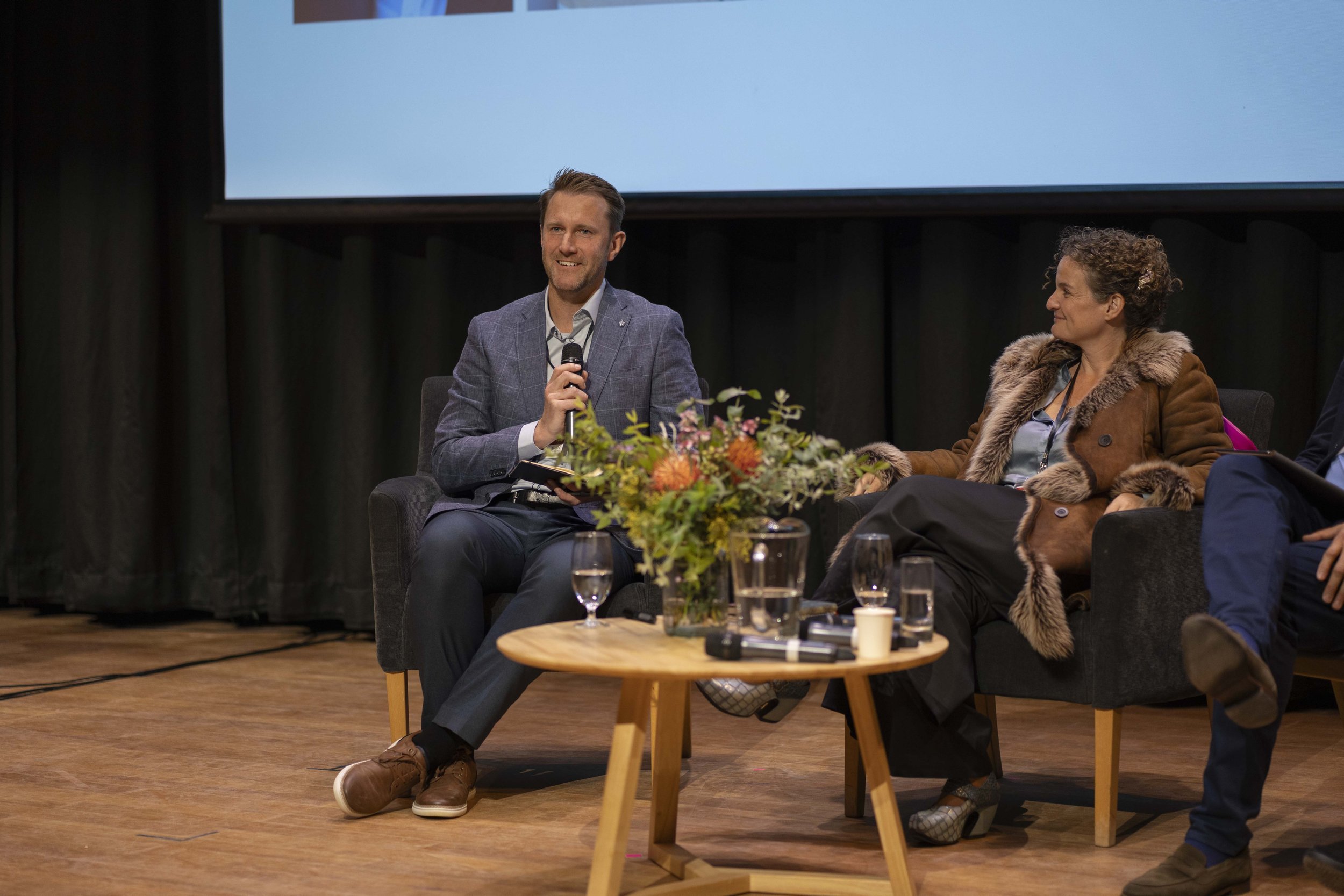
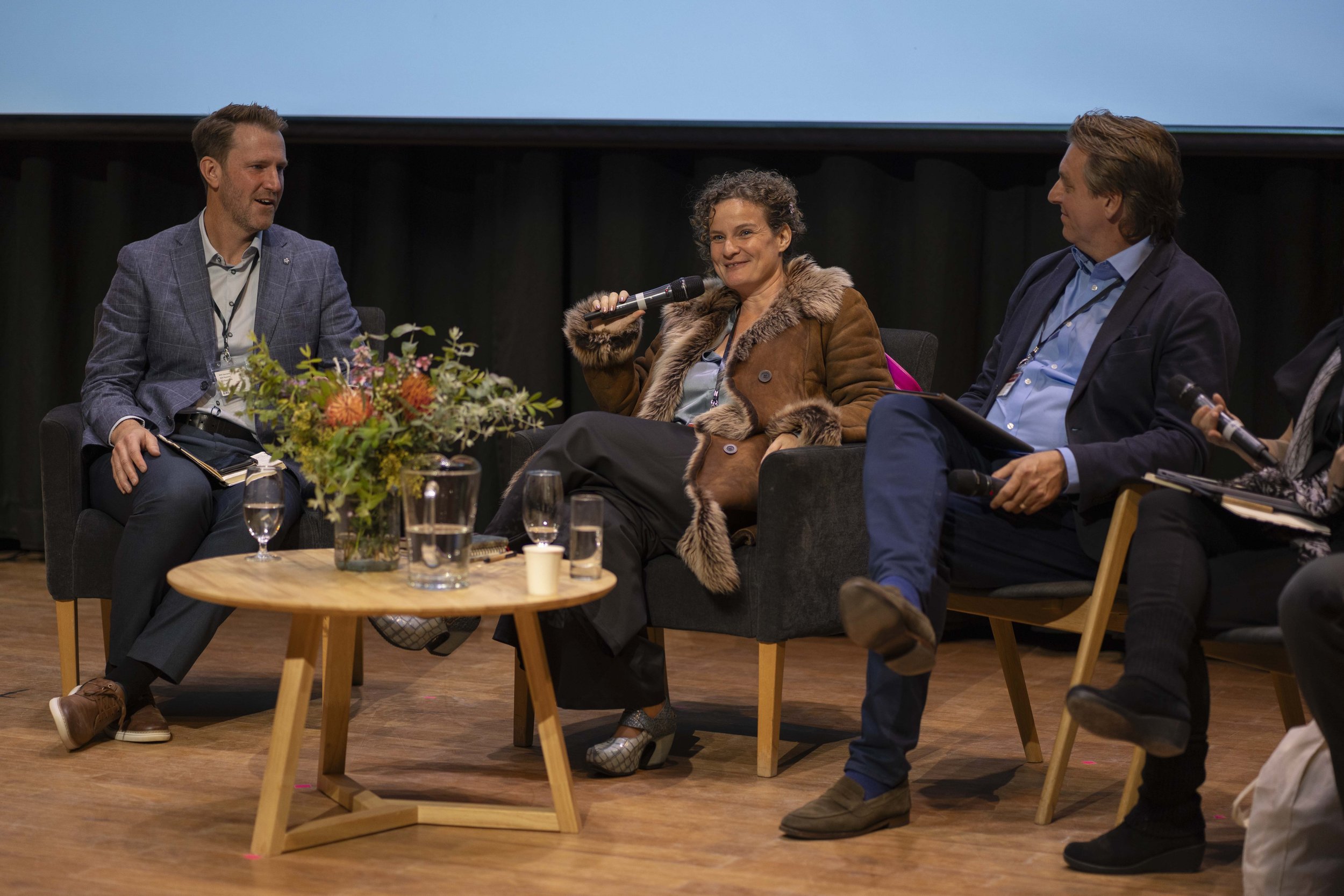
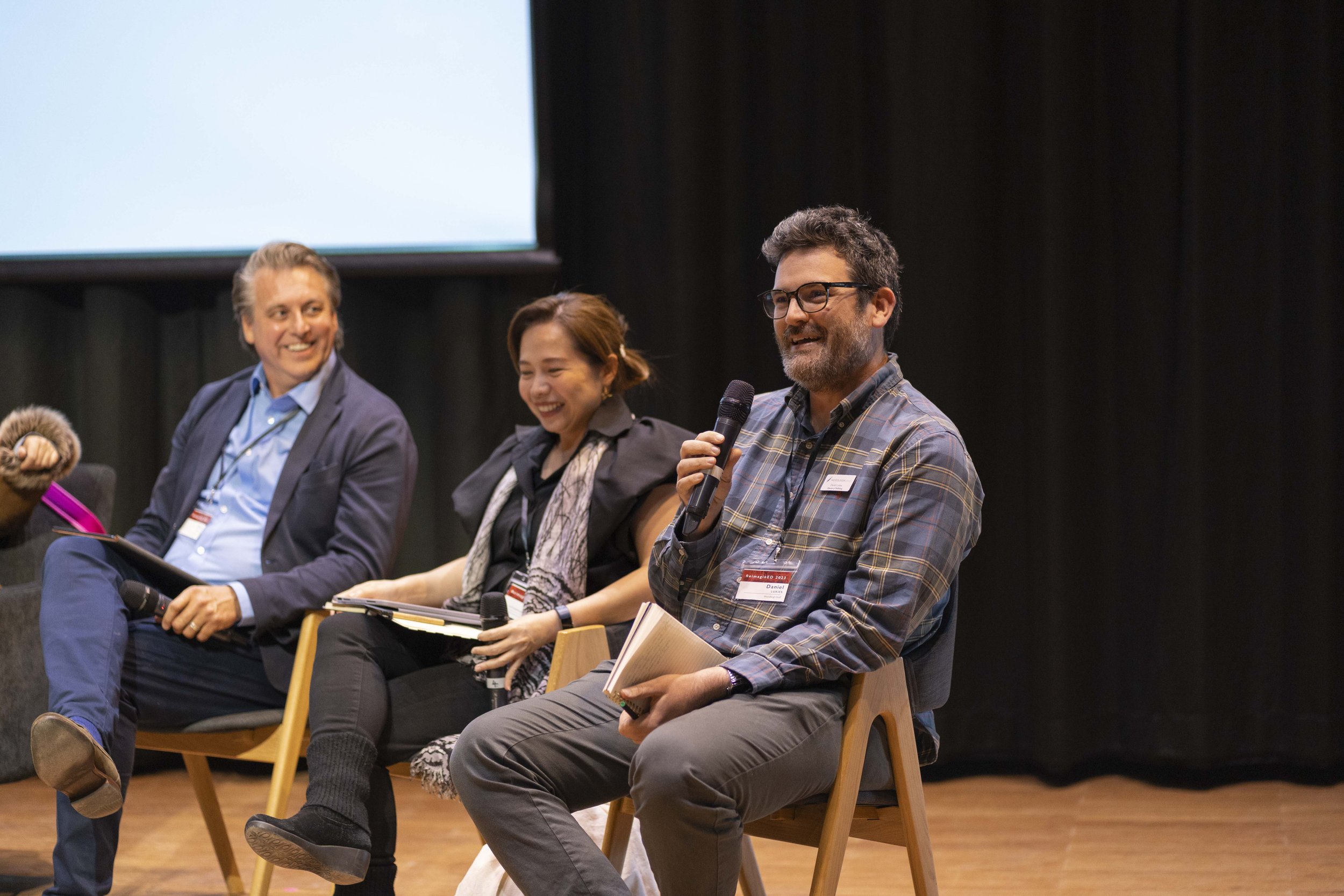
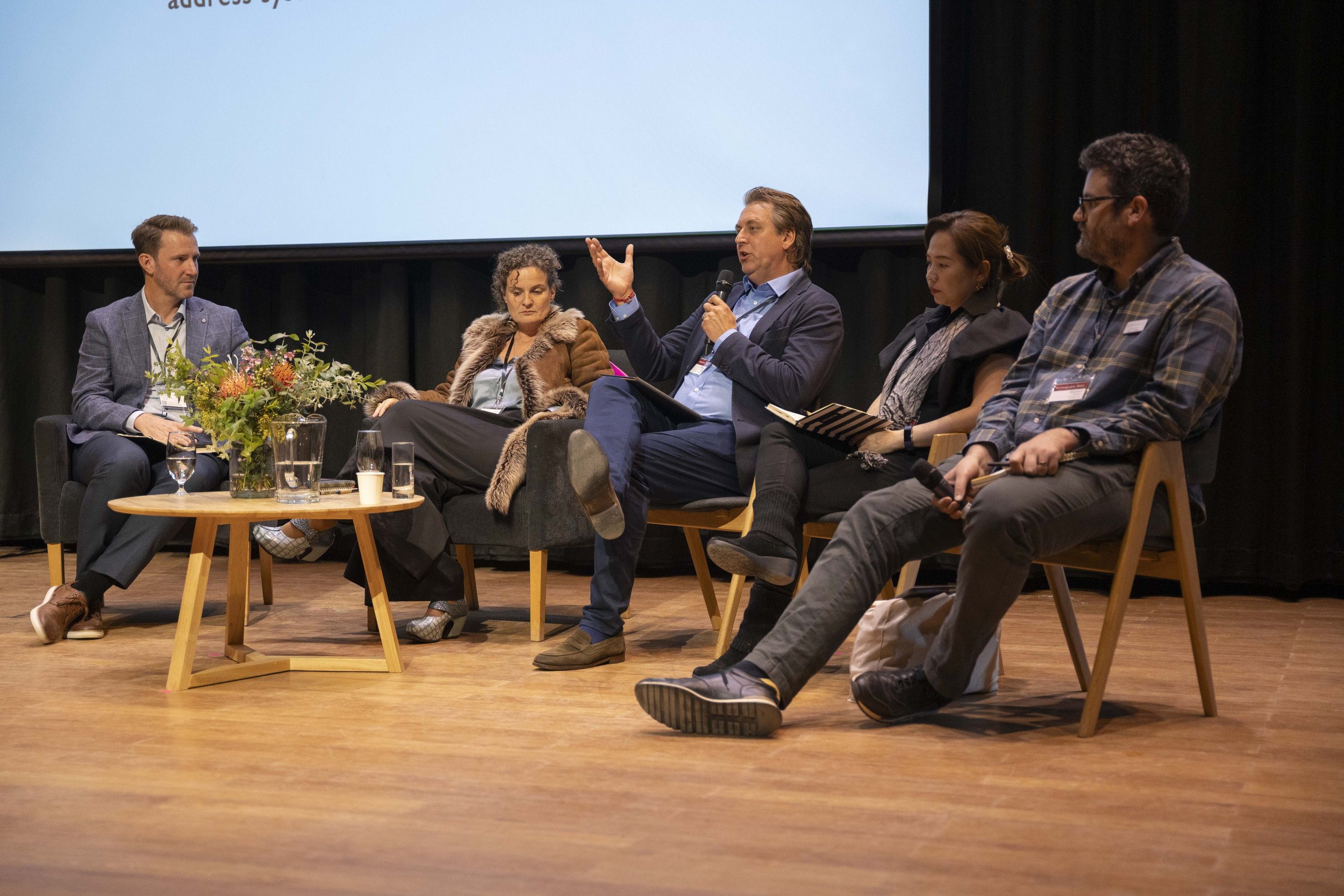
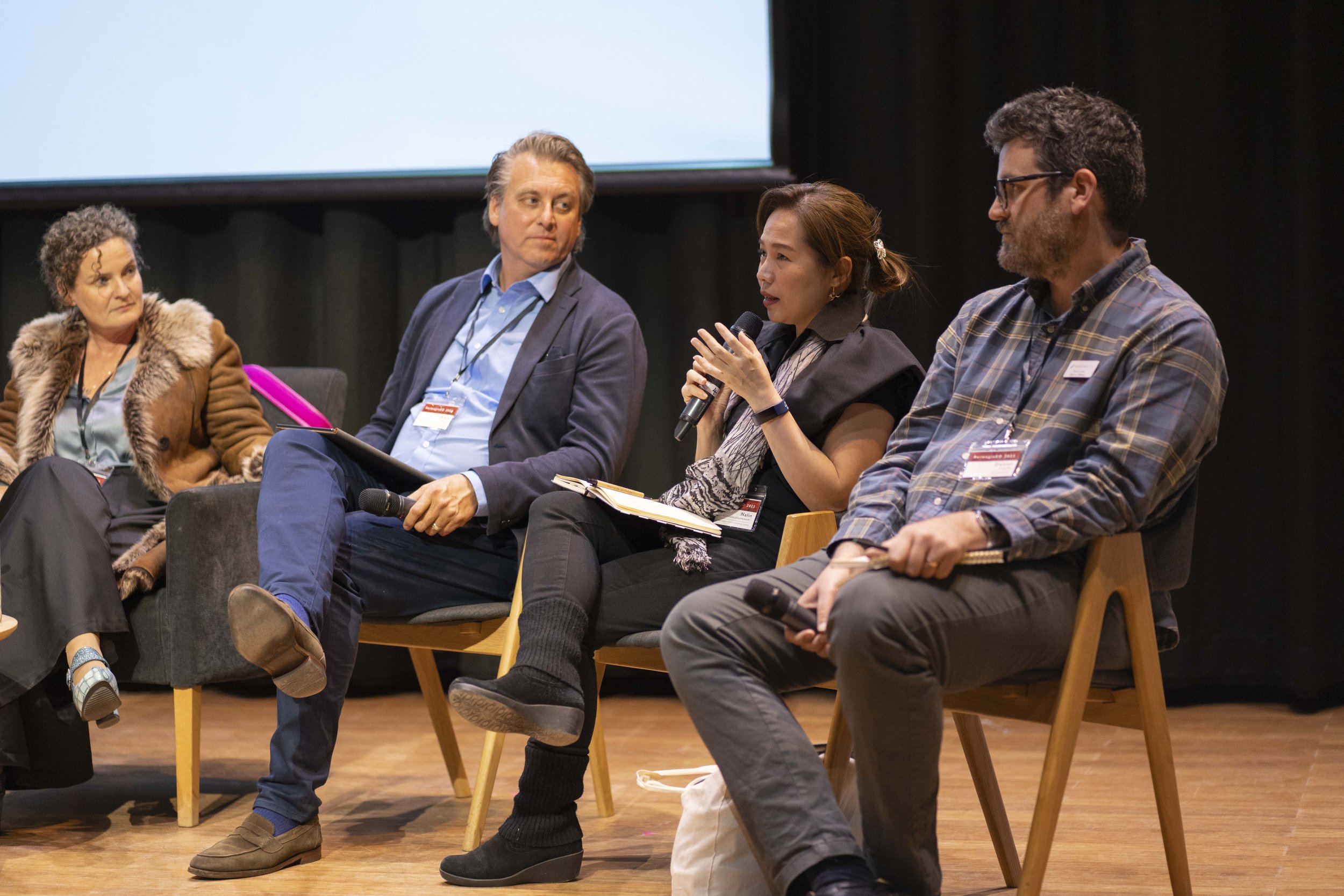
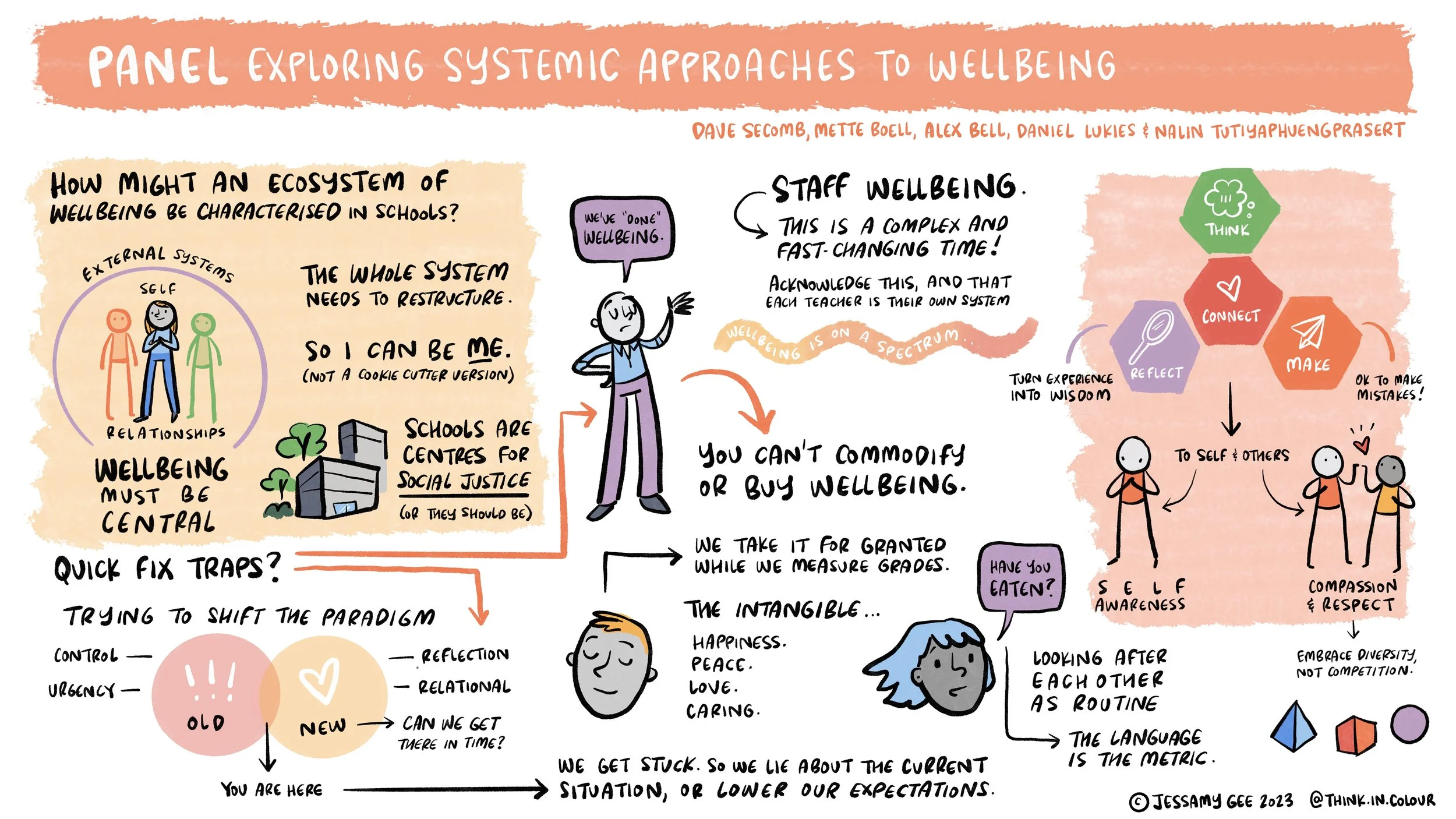
Leading Compassionate Systems Change - Dr Mette Boell
The final provocation of the conference was delivered by Dr Mette Boell, Co-Founder of the Center for Systems Awareness and the MIT Systems Awareness Lab. The session began with an examination of the multiple, interconnected crises facing people, places and the planet including issues such as mental health, climate change, and equity. Particular attention was focused in the discourse on the impact of these challenges on the wellbeing of young people, teachers and school administrators globally, with some disturbing insights into rising trends in youth suicide and the exodus from the teaching profession. As a way of addressing this metacrisis, Mette invited participants to consider how we might systematically organise across educational institutions for compassionate systems change that can shift the trajectory of future generations towards human and planetary flourishing, offering the work she is currently leading with her colleague, Dr Peter Senge, in partnership with schools from around the world, as a possible way forward.
Mette began the second part of her session by acknowledging the scale and complexity of the challenge for systems change, presenting a model of an educational ecosystem that not only included a consideration of the causal relationships between stakeholders, but also how their interactions are shaped by layers of meaning, emotions, and intergenerational dynamics. She shared insight into the work she is leading with a global community of researchers, educators, and young people to build individual and collective capacity for change through a focus on the development of systems awareness - the analytical, conceptual, and intuitive capacity to understand complex systems. A highlight of the session was an exploration of the concept of social fields, the dynamic spaces created through human interaction, and the practices currently being adopted in school settings to make them more generative and compassionate places. Mette concluded her session with a reflection on the wisdom of First Nations cultures around the world and the opportunities ahead for collaboration across cultures on how we might nurture personal, social, and planetary thriving.
You can access the slides from this session here.
Executive Summary
The provocations and breakout sessions at ReimaginED Melbourne were designed to support deep dialogue and collaboration on the emerging futures for education. While the ensuing discourse was diverse and wide-ranging, a summary of some of the major ideas and themes that emerged from the conference is included below.
The emergence of regenerative education
Many of the provocations and breakout sessions at this year’s conference explored the role that education might play in building the capacity of educators and young people to lead renewal, holistic growth, and improved wellbeing for people, places, and the planet. The concepts and ideas explored across the two days included place-based innovation, iteration and emergence, complexity and diversity, and leveraging biomimicry for deep learning. Significant threads in this discourse included the critical role that inner development plays in working towards more regenerative futures, and the dynamic, interdependent nature of the personal, social, societal, and natural worlds in which we live. Significantly, a feature of most of these sessions was their practical grounding in case studies of teaching and learning in schools from around the world, leaving participants with a sense of hope and possibility for the future.
Schools as centres for wellbeing
While student wellbeing is a perennial interest of educators, a significant number of workshops and presentations were dedicated to exploring the adoption of systemic approaches to wellbeing in our schools, in place of a more traditional focus on programs. At the heart of these sessions was a shared recognition that social and emotional learning and skill development requires safe and inclusive environments, and that the creation of these environments involves the ongoing collaboration of students, teachers, school leaders, and parents. Speakers and participants explored the diverse range of components that support systemic wellbeing, including leadership styles, organisational climate, community involvement, and classroom culture. In the final provocation of the conference, Dr Mette Boell reflected on the power and potential of such approaches to positively influence classrooms, teams, families, and society.
The critical importance of student agency
In the face of challenging times for education, the belief that students have the ability to positively influence their own and other’s lives, and the world around them was seen through the conference as a powerful driver for the development of innovative approaches to classroom practice, curriculum design, and student learning. While the term was defined in a range of ways in different sessions, it was commonly presented as a capability that can be developed over time, and applied in a range of social, creative, and moral contexts. Across the course of two days, participants engaged with a range of case studies from pioneering schools in the field, exploring the enablers and barriers for fostering student agency, as well as the implications for learning design. The concept of co-agency also featured in a number of sessions, acknowledging the influence of a student’s learning environment on their sense of agency, and the role that teachers, parents, and the wider community in the development of supportive learning environments.
The conference as a practice field
Over the past five years, the quality of the generative space it creates for innovative educators and thinkers to prototype ideas, programs and practices has become one of distinctive features of ReimaginED.
The vulnerability and trust shown by speakers in the community who attend the conference was visible in many of the breakout sessions, as they tested frameworks, sought feedback on new ideas, and invited collaboration across traditional organisational boundaries. The late Professor Edgar Schein, famous for his research on organisational culture, articulated the importance of such generative spaces for the development of professional practice. Schein (1995) described the role of these spaces as being to:
Provide psychological safety,
Create practice fields in which errors can be made, embraced, and learned from,
Expose learners to truly transformational concepts, and
Create the conditions for testing these concepts and developing the practices that flow from them
Where the experience of traditional conferences is often narrowly defined by the consumption of keynotes and the individual extraction of ideas, the structured time for reflection and relational learning that sits at the heart of ReimaginED creates a safe place for risk taking, deep collaboration, transformative learning, and the emergence of the new. In this way, the event also provides insight into the power and potential of new ways of gathering and supporting educators for systems change in education.
Acknowledgements
We would like to offer our sincere gratitude to the speakers who provided this year’s provocations: Allegra Moloney, Kevin House, Louka Parry, Anne Knock, Alex Bell, Leanne Hamley, and Mette Boell. We would also like to acknowledge the wonderful facilitators and speakers who led the breakout sessions and joined our panel: Tara Merks, Cameron Paterson, Mignon Weckert, Nat McLennan, Esther Hill, Dr Jodie Long, Dr Hugh Chilton, Hamish Curry, Mark Drummond, Dr Gary Simpson, Kim Shore, Meg Bailey, Wendy Gooley, Charlotte Forwood, Kate Manners, Nina Sharpe, Lisa Remato, Jodie Kirchner, Dorothee Seeto, Thea Snow, Christine Green, Mark Vickers-Willis, Frank Burridge, Amy White, Rod Davies, James Clapham, Kath Woolcock, Kate Giles, Jonathan Walter, Tom Zebell, Michael Bunce, Jacob Martin, Charlotte Ruddy, Nalin Tutiyaphuengprasert, Benjamin Freud, Duangruthai Phrompichai, Chinapat Mongkholsiriwattana, Daniel Lukies, Yanisa Tassanaviboon, and Napapat Kiratikamolchai.
Our special appreciation is also extended to Lionel Lauch, for his Acknowledgement of Country, Kavish Mazzella, for her captivating performance, Jessamy Gee, for her incredible graphic recording, and Dave Secomb, for helping to MC this year’s conference. Finally, a big thank-you to the participants for their involvement and engagement, as the ultimate purpose for ReimaginED is to create a space for deep learning and collaboration focused on how we can better serve the needs and aspirations of our young people.








